To be great is to be misunderstood. Ralph Waldo Emerson was talking about Socrates, Copernicus and Newton. But athletes can be misunderstood, too. And they have been since coaches, referees, commissioners, fans and reporters entered the sports equation.
Greatness attracts critics. It’s part of human nature. Sometimes, criticism is warranted. However, when people get the criticism wrong, or miss crucial information (by accident or design), being a genius in sports can go from a blessing to a curse real quick. Love turns to hate. Hostility ramps up. Misunderstandings harden. And false narratives endure.
We never get (or we forget) the whole story. It’s time to set the record straight with the most controversial athletes in sports history.
50. Albert Belle
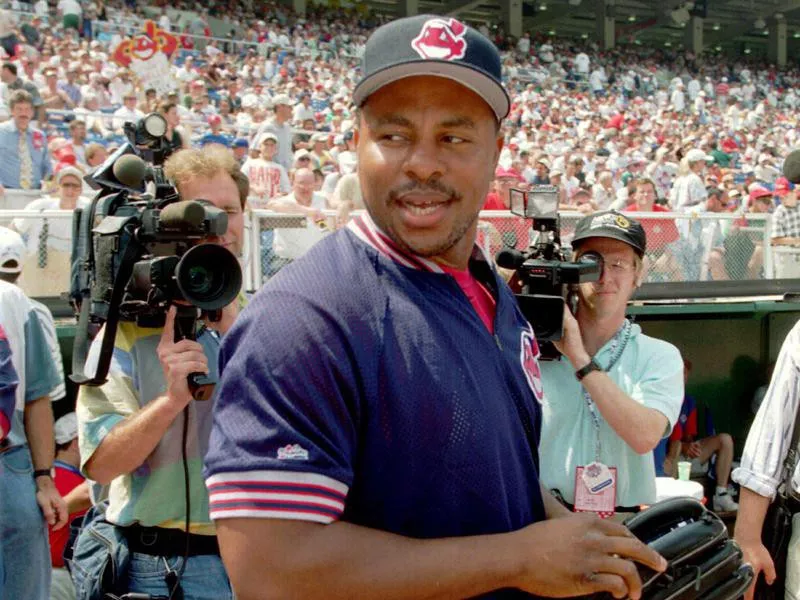
Rusty Kennedy / AP Photo
Sport: Baseball (MLB)
Position: Left fielder
Career: 1989-2000 (12 seasons)
Teams: Cleveland Indians, Chicago White Sox, Baltimore Orioles
Career stats: 1,539 G, .295 BA, 381 HR, 1,239 RBI, .933 OPS
Championships: None
Words to remember: “I talked to the media. They just didn’t like the words I gave them.” — Albert Belle after his playing career
Bottom line: Alcohol is a hell of a drug and can bring out the demons in some people. Albert Belle was one of them.
Despite being a history-making slugger — he was the first MLB player to hit 50 home runs and 50 doubles in a season (1995), and the first to make $10 million per year (1997) — Belle battled alcoholism his whole career. Osteoarthritis in his hips ended his playing days at age 33, and now he is remembered more for his outbursts and controversies off the field than his actions on it.
That’s not how the former Eagle Scout and LSU star was raised by his educator parents in Shreveport, Louisiana. But Belle became known as “Mr. Freeze” in the Show, because when he wasn’t crushing baseballs, he was smashing up clubhouses (which he preferred to be below 60 degrees). His cold personality cost him MVP votes and a shot at Cooperstown. And he’s still battling those demons.
Note: Stats are updated through Feb. 3, 2023.
49. Charles Oakley
Sport: Basketball (NBA)
Position: Power forward
Career: 1985-2004 (19 seasons)
Teams: Chicago Bulls, New York Knicks, Toronto Raptors, Washington Wizards, Houston Rockets)
Stats: 1,282 G, 9.7 PTS, 9.5 REB, 2.5 AST
Championships: None
Words to remember: “If it ain’t broke, don’t break it.” — Charles Oakley
Bottom line: Is it better to be loved or feared? Like Sonny (Chazz Palminteri) in “A Bronx Tale,” Charles Oakley lived to be feared.
Oakley, however, was much more than just Michael Jordan’s enforcer. The “Oak Tree” was an underrated basketball player, whether he was pulling down rebounds, clearing space for midrange jumpers (his own or a teammate’s) and locking up opponents. Jordan was sad and upset when Oakley was traded to the Knicks in 1988, but “His Airness” learned how to deal with it. So did Oakley.
Today, everyone’s got an “Oak story.” Some are more pleasant than others. Just ask James Dolan.
48. Richard Sherman
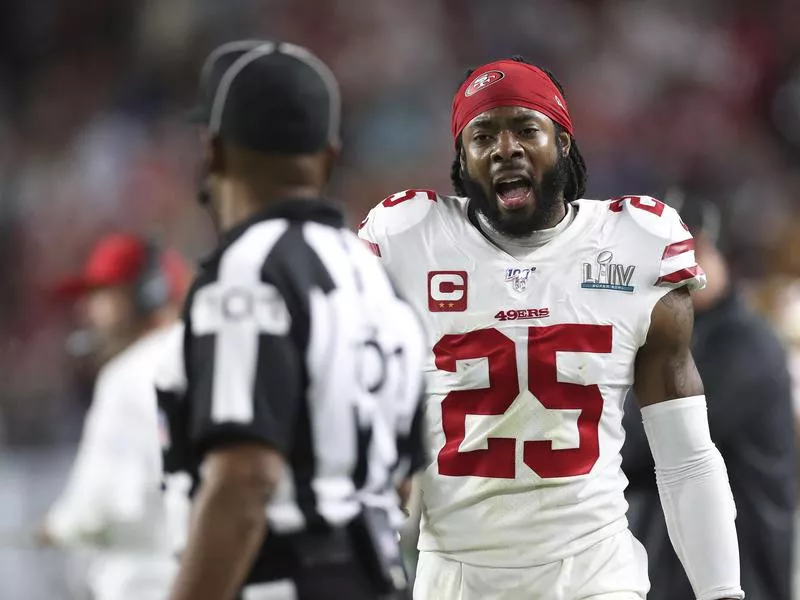
Doug Benc / AP Photo
Sport: Football (NFL)
Position: Defensive back
Career: 2011-21 (11 seasons)
Teams: Seattle Seahawks, San Francisco 49ers
Stats: 144 G, 37 INT, 5 FF (forced fumbles), 7 FR
Championships: 1 (2013)
Words to remember: “Richard Sherman reminds me of Wreck It Ralph because people think they are both bad guys but they are both really good guys. … Like they said in Wreck It Ralph, just because people think you are a bad guy doesn’t mean you are a bad guy. I love Richard Sherman and Wreck It Ralph.” — A child comparing Richard Sherman to the title character in the 2012 Disney film “Wreck-It Ralph,” after Sherman saved the 2014 NFC title game for the Seahawks against the 49ers and had a controversial celebration
Bottom line: Friends, family, fans, teammates and coaches have been defending Richard Sherman’s passion for a long time. But the three-time All-Pro corner’s work should speak for itself.
He graduated from Dominguez High School in Compton, California, with a 4.2 GPA (the second-highest in his class), while playing football and running track, he played football at Stanford and finished with a 3.9 GPA and an undergraduate and master’s degree in communications. He helped the Seahawks win their first Super Bowl, then battled back from an Achilles tear to become a leader on the 49ers’ defense.
“If you take the time to get to know him, you realize that drive helps him be successful,” said David Shaw, Sherman’s former coach at Stanford. “He’s not always going to say things you want him to say. He’s not always going to do things you want him to do. He’s methodical, he’s systematic, and when he believes something, he is going to go 100 miles an hour in that direction.”
In other words, appreciate the competitor.
47. DeMarcus Cousins
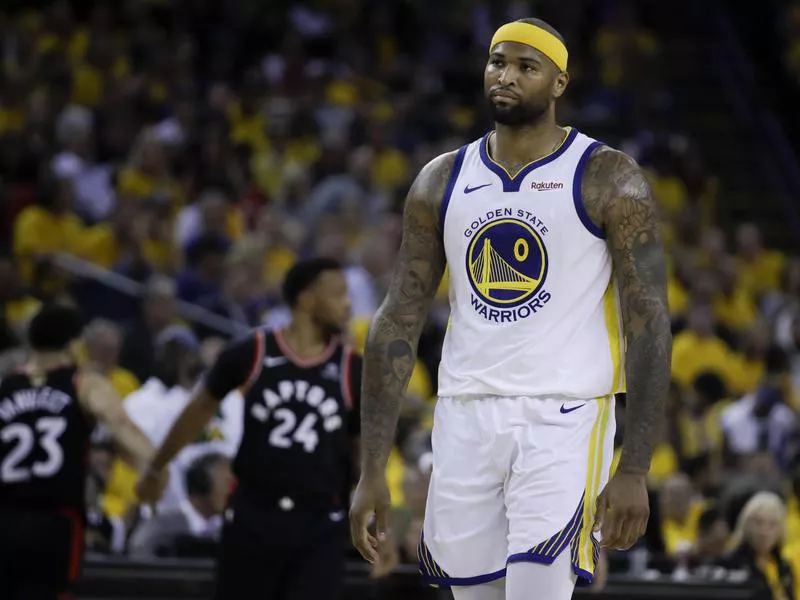
Ben Margot / AP Photo
Sport: Basketball (NBA)
Position: Center
Career: 2010-22 (11 seasons)
Teams: Sacramento Kings, New Orleans Pelicans, Golden State Warriors, Los Angeles Clippers, Milwaukee Bucks, Denver Nuggets
Stats: 654 G, 19.6 PTS, 10.2 REB, 3.0 AST, 1.1 BLK
Words to remember: “If you judge me only by my profession, you don’t know me at all. Those people who do that? They’ll never know me.” — DeMarcus Cousins
Bottom line: Don’t judge DeMarcus Cousins by all of his negative press. He is still growing into himself. Because the 6-foot-11 center looked like a man as a teenager in Mobile, Alabama, his emotional maturity has been trying to catch up ever since.
He’s also an undercover humanitarian. According to a 2014 ESPN The Magazine feature, Cousins gave back to the community when he played on the Kings — donating money to charities and free camps to disadvantaged kids in Sac-Town and Mobile — but Cousins prefers to keep his good deeds private.
“He could turn his entire image around in eight weeks if he would let it happen,” said a Kings official. Cousins’ response? “I don’t do things to be rewarded. I help people because it’s the right thing to do.”
Remember that next time you boo “Boogey.”
46. Caster Semenya
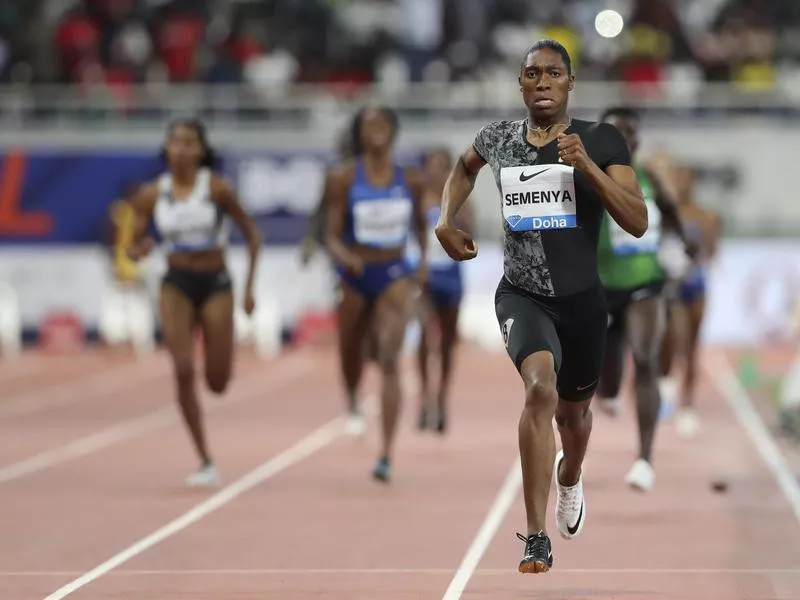
Kamran Jebreili / AP Photo
Sport: Track and field (middle-distance runner)
Career: 2008-19
Stats: Ran 1:54.25 in 800m, 3:59.92 in 1500m
Championships: Won gold in 800 meters at 2012/2016 Olympics, gold in 800 meters at 2009/201/2017 World Championships
Words to remember: “Since I have been in the sport, I have never really felt very supported. I’ve never felt recognized, especially by women. … What I know is that we are all athletes. We should be supporting each other, whether you are losing or not.” — Caster Semenya
Bottom line: How would you feel if the world questioned your identity every day? South African middle-distance runner Caster Semenya has had to deal with this reality her whole life.
She was born with XY chromosomes (making her a woman) and natural testosterone levels that exceed “normal” limits. Since youth, she has had to prove she was a woman when other runners struggled to compete against her.
“They started questioning, ‘Are you really a girl?'” she recalled. “One day, I walked naked into the change room to prove to them that I was a woman.”
On the international stage, she became the best 800-meter runner in the world, but her rivals continued to doubt the legitimacy of her wins. She had to take a sex verification test. She kept winning and battling athletic authorities over her testosterone levels. The issue sparked a global debate on gender politics, feminism and race. Semenya became an inspiration around the world.
In 2018, the International Association of Athletics Federations (IAAF) changed the rules and imposed new testosterone regulations that prevented Semenya from defending her title at the World Championships. She joined a South African soccer club to keep running. She says she won’t quit track and plans to keep fighting for the human rights of all female athletes.
45. Al Davis
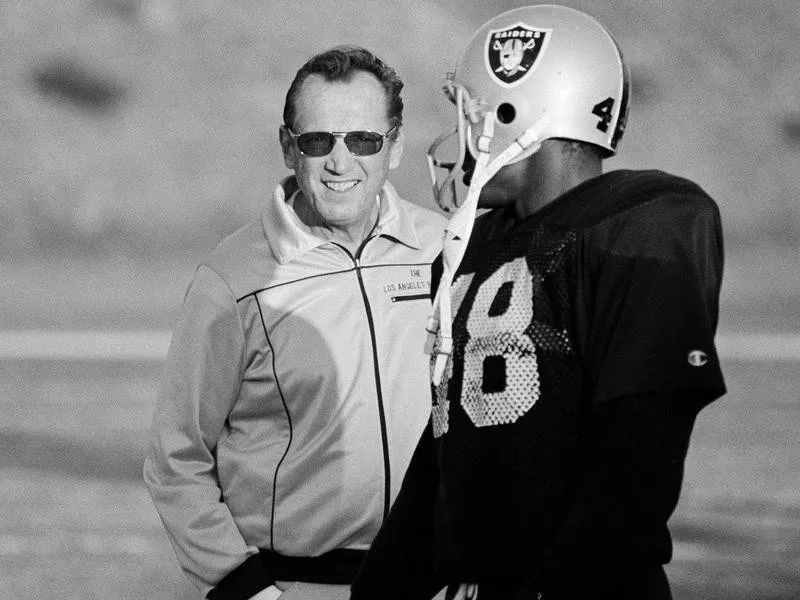
Lennox McLendon / AP Photo
Sport: Football (AFL and NFL)
Career: 1963-2010 (48 seasons — 3 as a coach, 45 as owner/general manager)
Teams: Oakland/Los Angeles Raiders
Stats: 409-310-1, .568 winning percentage
Championships: 3 (1976, 1980, 1983)
Words to remember: “Al Davis is the kind of person who would steal your eyes and try to convince you that you looked better without them.” — Former Cleveland Browns coach Sam Rutigliano
Bottom line: Al Davis was not a star athlete at any point in his life, no matter what Raiders media guides used to claim. But the kid from Brooklyn earned a reputation as a hard-nosed player in sports through college. It’s the same drive that turned him into a legend.
Although Davis never played a down in the NFL, the late Raiders owner is one of the most important people in league history — a pioneer who wasn’t afraid to do things that had never been done anywhere. Like hire the first Latino head coach (Tom Flores) and the first African-American head coach (Art Shell). He also hired a woman executive, Amy Trask, who was the team’s CEO from 1997 to 2013 and worked nearly three decades with Davis.
“I can tell you the No. 1 misconception about Al is that he wouldn’t tolerate or abide any disagreement,” Trask told Sports Illustrated in 2015. “If disagreeing with him and arguing with him were unacceptable to him, I would’ve been fired less than one month into my job.”
All Davis wanted to do was “just win, baby,” and he was relentless in his pursuit of football domination: “They said you had to take what the defense gave you. No, we are going to take whatever the hell we want.”
He didn’t care what others thought and did whatever he thought was best for the Raiders organization, creating a global brand and the most feared team in sports. Times have changed on the field for the Silver and Black, but players and fans still love Davis, who died in 2011 at the age of 82. And Raider Nation is as strong as ever.
44. Carlos Beltran
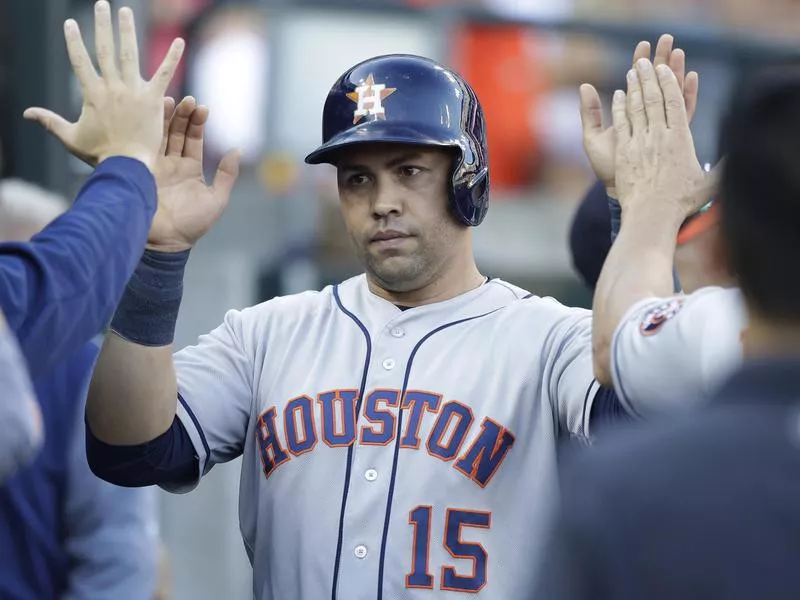
Carlos Osorio / AP Photo
Sport: Baseball (MLB)
Position: Center fielder
Career: 1998-2017 (20 seasons)
Teams: Kansas City Royals, Houston Astros, New York Mets, San Francisco Giants, St. Louis Cardinals, New York Yankees, Texas Rangers
Stats: 2,586 G, 2,725 H, .279 BA, 435 HR, 1,587 RBI, .837 OPS
Championships: 1 (2017)
Words to remember: I was joking with somebody that their biggest free-agent acquisition is Carlos Beltran. (wink). I know how it works. He’s helping a lot. They’re paying attention to details, and we have to clean our details. It was eye-opening, the last few days — from top to bottom. And I’m not saying devices — all that stuff. It’s just stuff that the game will dictate and will scream at people. And he’s right there. Throughout the evening, I was looking and I saw it. And right now, they’re a lot better than us.” — Former Boston Red Sox manager Alex Cora after a 2019 London Series game against the New York Yankees
Bottom line: Carlos Beltran may have helped mastermind the Houston Astros’ sign-stealing operation, but let the person who is without trash-can-whacking sin cast the first stone.
Sign-stealing has been a part of baseball since the beginning of the game. That doesn’t make it right. But it’s also wrong to scapegoat Beltran for MLB’s sign-stealing scandal. He was the only player named in commissioner Rob Manfred’s report. So you’re telling us this was an elaborate one-man operation? That must make Beltran a new Marvel superhero.
He already lost his New York Mets managing job. After he serves a reasonable punishment, he should get another opportunity in baseball.
It also would be nice if MLB meted out some actual punishments for players. But don’t hold your breath on that.
43. Joakim Noah
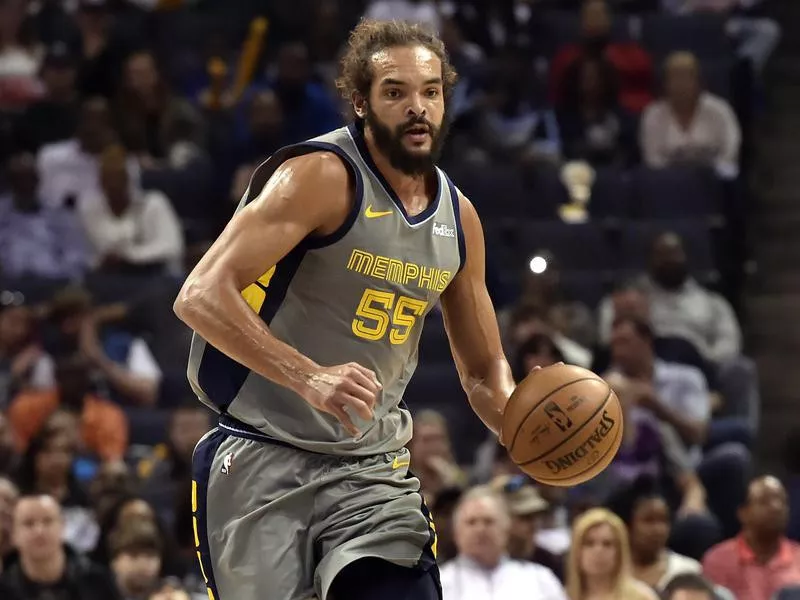
Brandon Dill / AP Photo
Sport: Basketball (NBA)
Position: Center
Career: 2007-19 (12 seasons)
Teams: Chicago Bulls, New York Knicks, Memphis Grizzlies
Stats: 667 G, 8.8 PTS, 9.1 REB, 2.8 AST, 1.3 BLK
Words to remember: “My father was a competitor, a fiery player, and I’m that way, too. The way I am on the court is completely different from who I am off the court.” — Joakim Noah
Bottom line: Weirdo. Free spirit. A different breed. That’s how some of Joakim Noah’s former teammates have described him. He’s also been called a great competitor, teammate and warrior.
“If you look at him statistically, there may not be a full appreciation for what he brings,” said former Chicago Bulls coach Tom Thibodeau. “Statistics are good, but it’s the body of work that he brings to the team. … There’s a finesse part of his game that’s guard-like, where he can dribble and pass and make quick decisions off the dribble.”
That’s what you get when you mix a French tennis legend (Yannick Noah) with a Swedish model-turned-sculptor/art therapist (Cecilia Rodhe). The younger Noah — who was born in New York City, raised in Paris and enjoys living in Venice Beach, California — still is not easy to classify.
42. Joe Namath
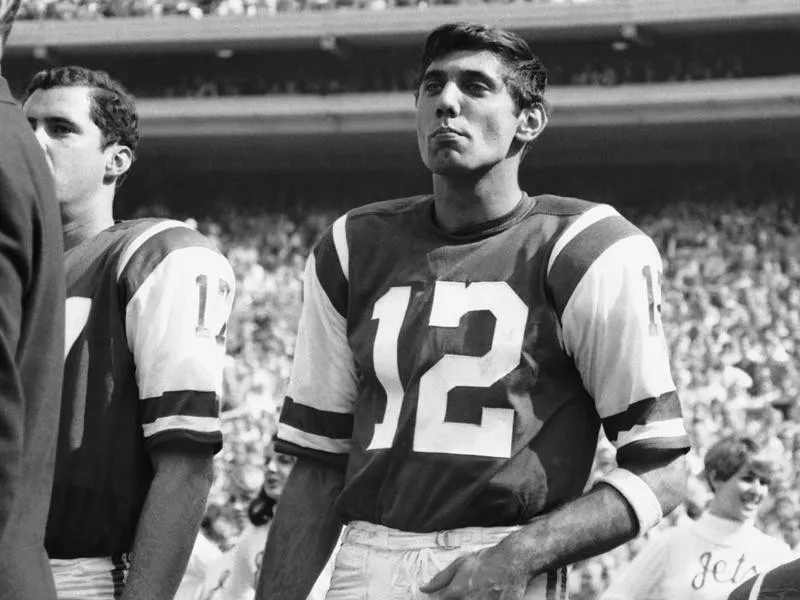
Duricka / AP Photo
Sport: Football (AFL/NFL)
Position: Quarterback
Career: 1965-77 (13 seasons)
Teams: New York Jets, Los Angeles Rams
Stats: 140 G, 27,663 YDS, 50.1 CMP%, 173 TD, 220 INT
Championships: 1 (1968)
Words to remember: “If you aren’t going all the way, why go at all?” — Joe Namath
Bottom line: Stats aren’t everything. While Joe Namath has the numbers of a journeyman quarterback, his impact on the game goes beyond quantifiable metrics.
The intangibles mattered more with “Broadway Joe.” Sure, his guarantee for Super Bowl III is famous, but his playboy celebrity lifestyle and charismatic personality helped raise the profile of football in the 1960s and ‘70s and bring in more of a national audience.
Namath was bigger than football. Men wanted to be him. Women wanted to be with him. That’s why he is in the Hall of Fame and belongs to be there.
41. Eric Lindros
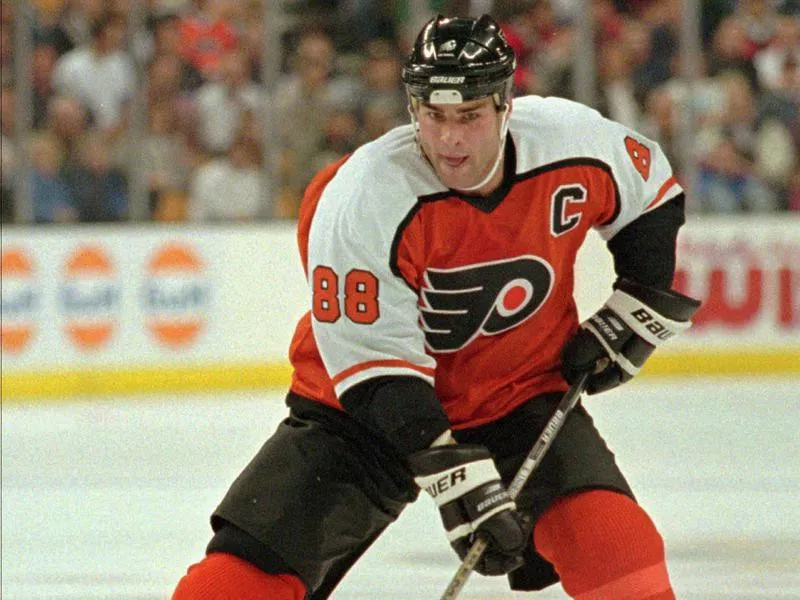
Ed Nessen / AP Photo
Sport: Hockey (NHL)
Position: Center
Career: 1992-2007 (13 seasons)
Teams: Philadelphia Flyers, New York Rangers, Toronto Maple Leafs, Dallas Stars
Stats: 760 GP, 372 G, 493 AST, 865 PTS
Championships: None
Words to remember: “Looking back, the greatest thing that could ever have happened to Eric Lindros was coming to play in Sault St. Marie, just to get the hell away from those parents. It would’ve been like when you send a kid away to university to give him a chance to grow up. I’ll tell you: That kid has never grown up.” — Sault St. Marie Greyhounds director and former general manager Angelo Bumbacco, in 2001, on wanting to pick Eric Lindros No. 1 in the 1989 Ontario Hockey League draft
Bottom line: Eric Lindros didn’t have too many opportunities to be misunderstood. That’s because his parents didn’t let him talk until he was 19 and made his NHL debut. That might be an exaggeration, but not by much.
Lindros’ parents, Carl and Bonnie, are in the pushy parents Hall of Fame. Of course, the Canadians see their family interference in his career another way. “He pushes us, we don’t push him,” Carl once said.
All that hands-off parenting worked. Lindros was inducted into the Hockey Hall of Fame in 2016, and his parents even let him say a few words.
40. Pete Weber
Sport: Bowling (PBA, PBA50)
Career: 1979-present
Stats: 37 PBA titles (10 majors), 11 PBA50 titles (4 majors)
Words to remember: “Who do you think you are? I am!” — Pete Weber
Bottom line: Pete Weber is the son of professional bowling’s first superstar, Dick Weber, so he had some big bowling shoes to fill.
That explains why the young Weber has spent a lifetime honing his maverick persona. He reached peak rebellion after winning his fifth U.S. Open title in 2012 and unleashed the above quote to silence a heckler.
“But what I really wanted to say was, ‘Who do you think you are rooting against me? I’m the man of this tournament!'” said Weber. “That’s what I really wanted to say, but as everybody knows, it’s ‘Who do you think you are? I am!’ … which, it caught on! It’s a worldwide catchphrase now.”
Keep rolling, kids, and you, too, could have your own catchphrase one day.
39. Eli Manning
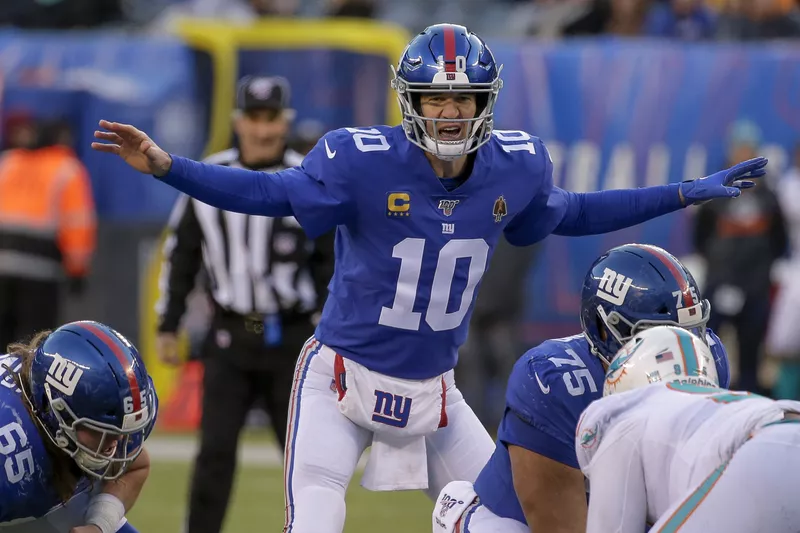
Seth Wenig / AP Photo
Sport: Football (NFL)
Position: Quarterback
Career: 2004-19 (16 seasons)
Teams: New York Giants
Stats: 236 G, 57,023 YDS, 60.3 CMP%, 366 TD, 244 INT
Championships: 2 (2007, 2011)
Words to remember: “That right there is the classiest, most dependable sports figure to ever play in the tri-state area.” — An elderly man at New York City-restaurant Campagnola on Dec. 15, 2019, about Eli Manning. The Giants quarterback was dining with friends to celebrate his final start and win at Giants Stadium. The man directed the comment to a nearby stranger, Greg Leder, Eli’s friend (unbeknownst to the man), who was about to eat with the quarterback.
Bottom line: What you saw is not what you got with Eli Manning. He wasn’t a rah-rah guy, so it was easy to overlook and underappreciate his greatness. But behind the aw-shucks demeanor was a fierce competitor.
Eli called it a career after 16 NFL seasons. His father, former NFL quarterback Archie Manning, was most proud of his youngest son’s iron-man work ethic. “He answered the bell every Sunday. He was pretty amazing throughout his career, high school and college, he never missed any time because of injuries. Everyone has to play hurt sometimes, but he was always there. He was coachable … a good teammate. At least his teammates say he was.”
What more can you ask for? How about two Super Bowl wins and two Super MVPs against Tom Brady, Bill Belichick and the New England Patriots?
The Hall of Fame should be calling another Manning name one day.
38. Kareem Abdul-Jabbar
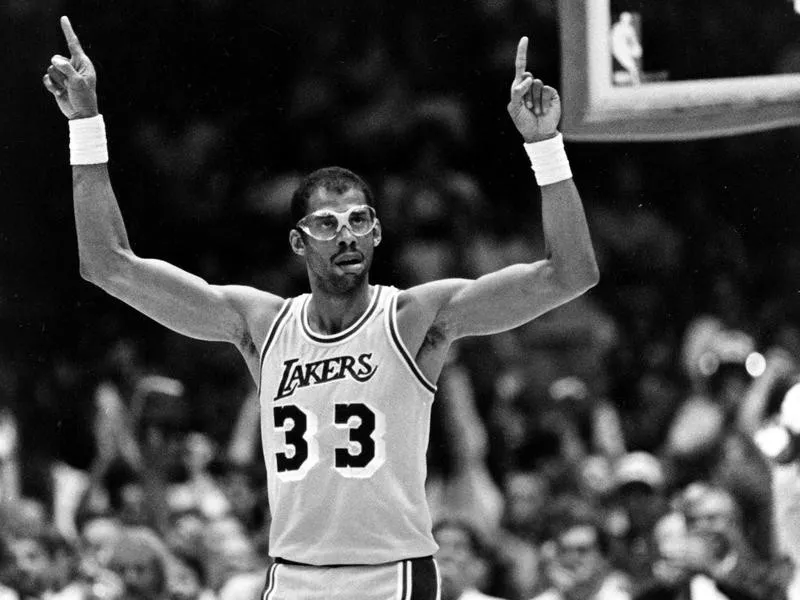
Nick Ut / AP Photo
Sport: Basketball (NBA)
Position: Center
Career: 1969-89 (20 seasons)
Teams: Milwaukee Bucks, Los Angeles Lakers
Stats: 1,560 G, 24.6 PTS, 11.2 REB, 3.6 AST, 2.6 BLK
Championships: 6 (1971, 1980, 1982, 1985, 1987, 1988)
Words to remember: “One man can be a crucial ingredient on a team, but one man cannot make a team.” — Kareem Abdul-Jabbar
Bottom line: How can the NBA’s all-time scoring leader be misunderstood? Easy. Kareem Abdul-Jabbar played most of his career with Magic Johnson, the greatest showman in NBA history, in Los Angeles, the entertainment capital of the world. Although Jabbar was known as “Cap” (as in “Captain”), he was much more cerebral than your typical athlete.
His classic movie cameo with a kid while playing airline pilot Roger Murdock in the spoof comedy “Airplane!” distills the essence of the Big Fella’s frustration.
Joey: I think you’re the greatest, but my dad says you don’t work hard enough on defense. And he says that lots of times, you don’t even run down court. And that you don’t really try … except during the playoffs.
Murdock: The hell I don’t!! ( grabs Joey by collar ) LISTEN KID! I’ve been hearing that crap ever since I was at UCLA. I’m out there busting my buns every night. Tell your old man to drag Walton and Lanier up and down the court for 48 minutes.
Jabbar has found peace in retirement, sharing his wisdom as an activist, book author and columnist (for Time, The Guardian and other media outlets) on non-sports matters.
37. Serena Williams
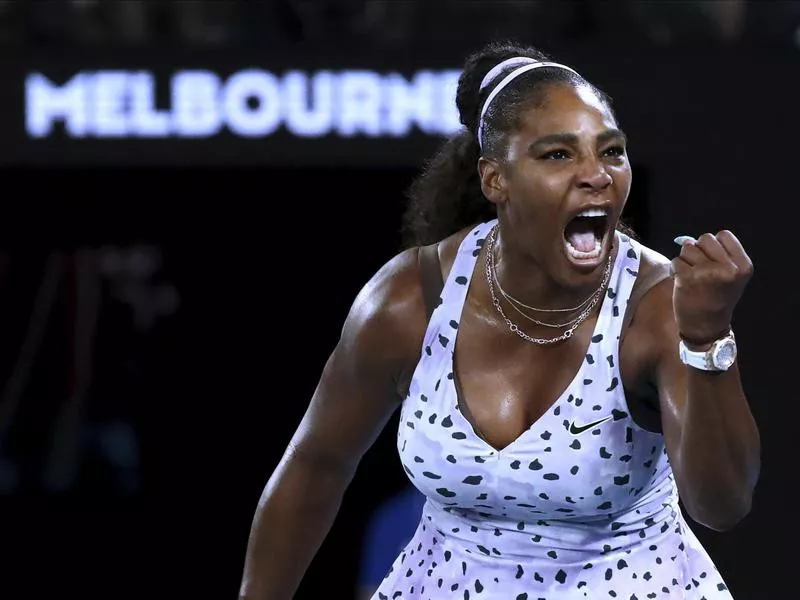
Dita Alangkara / AP Photo
Sport: Tennis (WTA)
Career: 1995-2022
Stats: 858-156, 73 singles titles, 23 majors
Words to remember: “You become proud, you see all the stuff your people went through so you have an opportunity. Like that poem that Maya Angelou said, that we are the hope and the dream of a slave. If you think about what the slave had to go through, and then the life that we are privileged to live — I wouldn’t want to be any other color. There’s no other race, to me, that has such a tough history for hundreds and hundreds of years, and only the strong survive, so we were the strongest and the most mentally tough, and I’m really proud to wear this color every single day of my life.” — Serena Williams on learning about black history on TV as a kid and being proud of her roots
Bottom line: Serena Williams changed tennis. But it wasn’t always easy. Growing up in Compton, California, she and her family didn’t have much besides spirit. “I went on a court just with a ball and a racket and with a hope,” she once said. After she turned pro, her success brought critics who questioned her value to the sport, along with her physique and physical strength and outspokenness.
But she persevered and today has won more Grand Slam singles titles than any man or woman in the Open Era, is a style trendsetter and has a net worth of $225 million. In 2019, Williams became the first athlete to ever make Forbes’ list of the richest self-made women in America.
The superstar continues opening doors for black women athletes and has become a role model for mothers everywhere after having a baby in 2017 and then returning to the pro tour.
36. Mark Fidrych
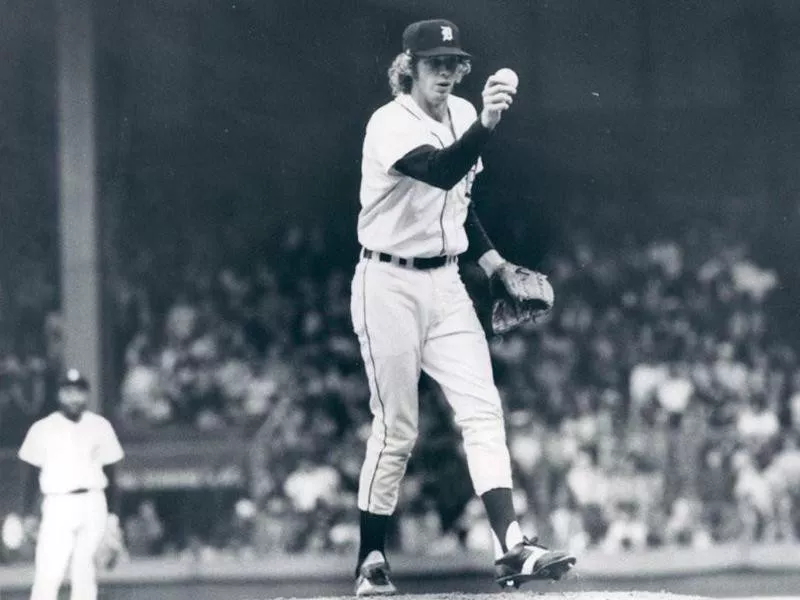
Donald Papp/Tiger Stadium 1912 / Facebook
Sport: Baseball (MLB)
Positions: Pitcher
Career: 1976-80 (5 seasons)
Teams: Detroit Tigers
Stats: 58 G, 412.1 IP, 29-19, 3.29 ERA, 170 K
Championships: None
Words to remember: “He was a trailblazer. Everyone playing in the major leagues today owes a debt of gratitude to Mark Fidrych. He brought baseball back to the people. He made it popular again. He helped save the game.” — Former Detroit Tigers left fielder Willie Horton at Mark Fidrych’s funeral in 2009. Fidrych died at the age of 54 following an accident at his farm in Masschusetts.
Bottom line: “The Bird” was the word in Detroit in 1976. Every one of his 29 starts that rookie season was magical.
A humble character, the lanky 21-year-old from Worcester, Massachusetts, captivated a country with a 19-6 record, 2.34 ERA and 24 complete games. He showed that being unique and misunderstood was OK and made ordinary people believe they could do something extraordinary, too.
Grooming the dirt around the mound? Talking to the baseball? High-fiving teammates after routine plays? Thanking umpires, fans and police officers? You don’t see that anymore.
Mark Fidrych was one of the good guys. He left the game (and world) too soon. But for a brief moment, he was some kind of unbelievable.
35. Dennis Rodman
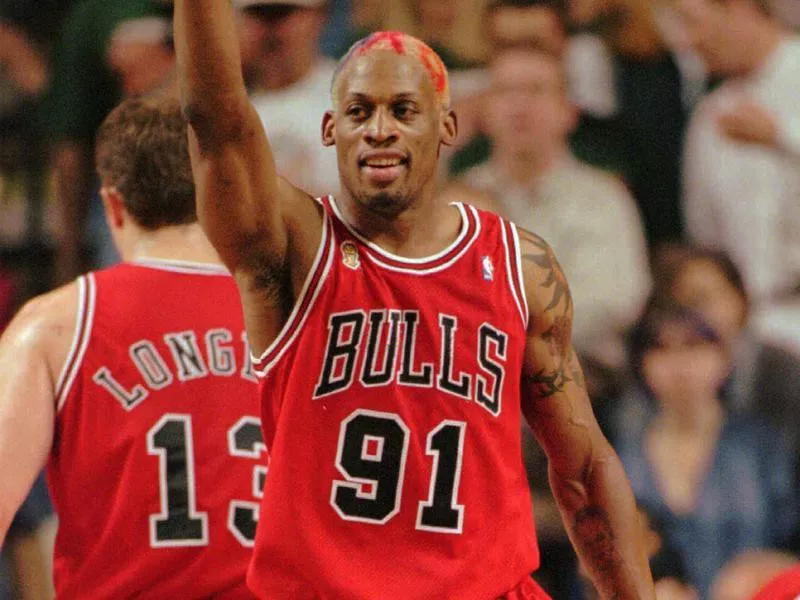
Elaine Thompson / AP Photo
Sport: Basketball (NBA)
Position: Power forward
Career: 1986-2000 (14 seasons)
Teams: Detroit Pistons, San Antonio Spurs, Chicago Bulls, Los Angeles Lakers, Dallas Mavericks
Stats: 911 G, 7.3 PTS 13.1 REB, 1.8 AST
Championships: 5 (1989, 1990, 1996, 1997, 1998)
Words to remember: “There is so much hypocrisy in sports.” — Dennis Rodman
Bottom line: The NBA has never seen anyone like Dennis Rodman. And likely never will again. A rebounding machine and defensive force, he played the game with reckless abandon.
Fame and fortune brought out the many sides of “The Worm.” But take away the colored hair, body piercings, cross-dressing, and all of his wild behavior, and he was a kid who grew up poor, with a single mom and two sisters, after his father, a Vietnam War vet, left the family.
“I haven’t seen my father in more than 30 years,” Rodman wrote in his 1997 biography “Bad As I Wanna Be,” “so what’s there to miss … I just look at it like this: Some man brought me into this world. That doesn’t mean I have a father.”
Basketball saved Dennis Rodman. Now, the man who calls Kim Jong Un a “friend for life” is doing what he can to save the world.
34. Andre Agassi
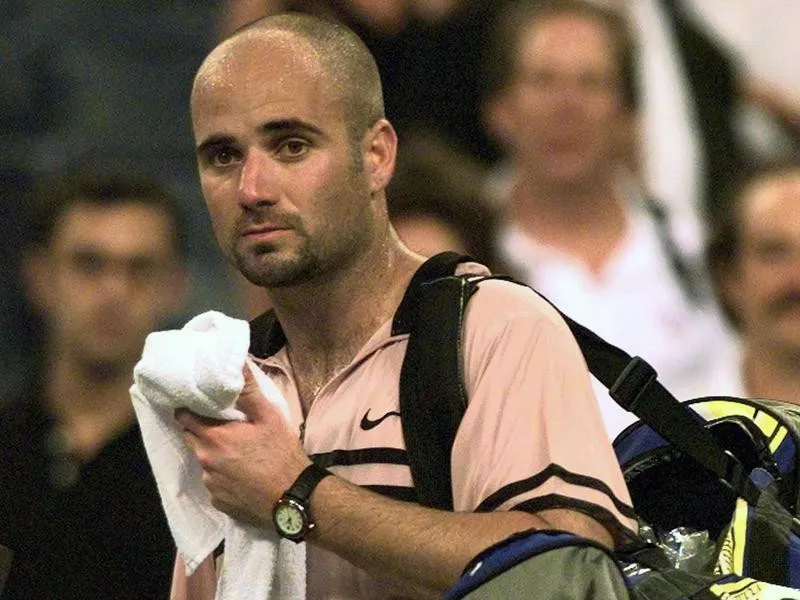
Ron Frehm / AP Photo
Sport: Tennis (ATP)
Career: 1986-2006
Stats: 870-274, 60 singles titles, 8 majors
Words to remember: “You can’t spread who you are without being broken first. Sometimes, when you’ve been broken into pieces, you come back and give much more to people. You can see my scars, and they’re key to me making a difference in other lives now. You can’t have any wounds in this game that don’t leave scars. They never quite heal, but they make you who you are.” — Andre Agassi
Bottom line: The Andre Agassi story is not your typical tale of a tennis prodigy.
The son of a former boxer from Iran who was relentless in pushing for greatness, Agassi burst on the tennis scene at 16 like a rock star out of Las Vegas and Nick Bollettieri’s Tennis Academy in Florida. Before Agassi crossed over to the dark side and burned out, he saw the light and evolved into a champion.
Now, he is a family man, married to Steffi Graf with two children, creating opportunities through education with his foundation. “My dad is the reason I’m in education now,” Agassi says. “My lack of education, a lack of choice, had a huge impact. The question always remains: What might you have done? But I don’t have any deep regrets.”
33. Bill Laimbeer
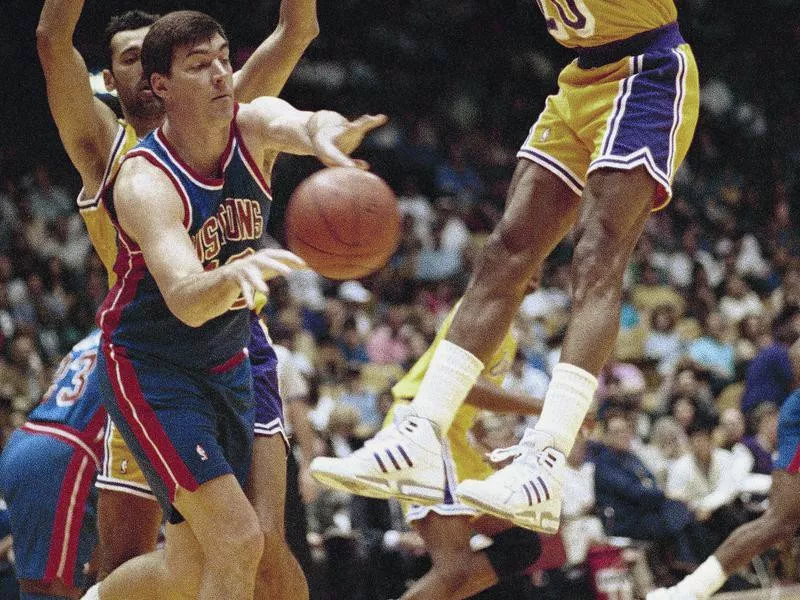
Chris Martinez / AP Photo
Sport: Basketball (NBA)
Position: Center
Career: 1980-94 (14 seasons)
Teams: Cleveland Cavaliers, Detroit Pistons
Stats: 1,068 G, 12.9 PTS, 9.7 REB, 2.0 AST,
Championships: 2 (1989, 1990)
Words to remember: “I’ve had to get over that. It hasn’t happened, for whatever reasons. If it does happen, it would be an oh-my-God moment. But I don’t really care what NBA people think. I’ve always been who I am, and I’m not going to change my style to fit their mold. I’m just not a career assistant. I’m not that guy. I had to decide if going into the ladies’ league would hurt my chances to be in the men’s league, and I came to the conclusion that I didn’t care. I thought, ‘Coaching basketball is coaching basketball.'” — Bill Laimbeer, in a 2013 ESPNW profile, on coaching in the WNBA instead of the NBA
Bottom line: Bill Laimbeer wasn’t just the most hated player in the NBA during his playing days. Many people considered him the worst human being on the face of the earth. Everyone else was a fan because he played on their team.
Not much has changed, except these days Laimbeer coaches in the WNBA since he can’t get a job in the NBA. His first and only NBA coaching job, on Kurt Rambis’ staff with the Minnesota Timberwolves (2009-11), left the impression that he’s still a whiny crybaby, and no one wants to play for him.
The former “Bad Boy” has always frustrated folks because he’s good at basketball. But he’s not an ego manager, and his in-your-face approach connects better with women. The attitude goes back to his wealthy, privileged upbringing (first in Clarendon Hills, Illinois, then in Palos Verdes, California) and perhaps some insecurity.
“I’m the only player in the NBA who makes less money than his father,” the Notre Dame graduate once joked about his dad, who was president of a Fortune 500 company.
32. Mark McGwire
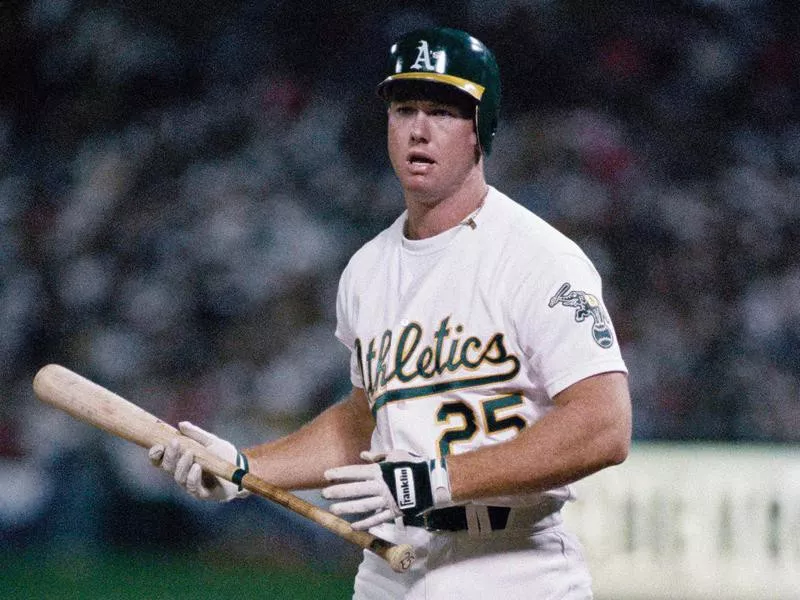
Lennox McLendon / AP Photo
Sport: Baseball (MLB)
Position: First base
Career: 1986-2001 (16 seasons)
Teams: Oakland Athletics, St. Louis Cardinals
Stats: 1,874 G, 1,626 H, .263 BA, 583 HR, 1,414 RBI, .982 OPS
Championships: 1 (1989)
Words to remember: “The mind is a powerful thing, and most people don’t use it properly.” — Mark McGwire
Bottom line: Mark McGwire didn’t need steroids to be the next Babe Ruth. He could have been a real-life Paul Bunyan on his own. All the juice did was ruin his reputation.
“Performance-enhancing drugs are an illusion,” McGwire admitted. “I wish I had never gotten involved in steroids. It was wrong. It was stupid.”
“Big Mac” was welcomed back to the baseball fraternity as a hitting coach after atoning for his sins with a public admission of guilt.
But until Hall of Fame voters forgive steroid users, no one from the Steroids Era is getting into Cooperstown. That includes McGwire, who deserves to be there.
31. Bill Belichick
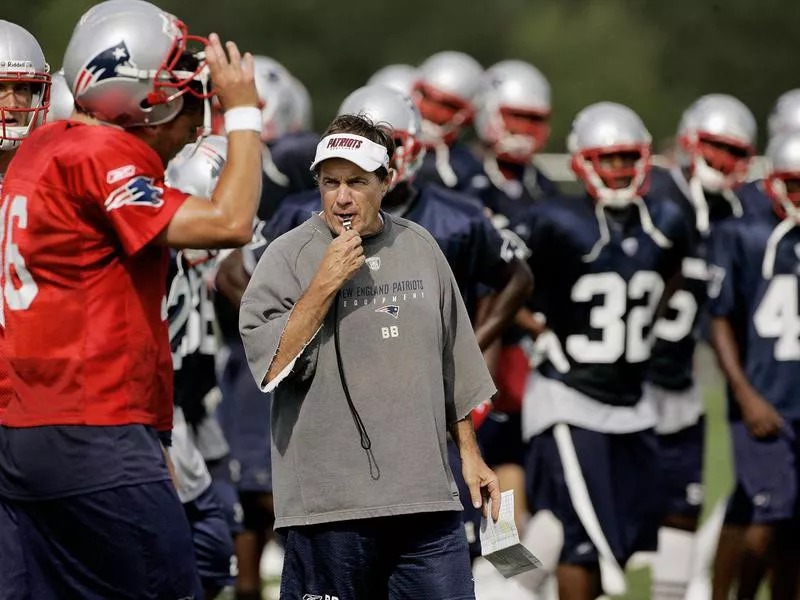
Stephan Savoia / AP Photo
Sport: Football (NFL)
Career: 1991-95, 2000-present (28 seasons)
Stats: 298-152, .662 winning percentage, 31-13 in postseason (.705)
Championships: 6 (2001, 2003, 2004, 2014, 2016, 2018)
Words to remember: “His line is: ‘I’ve forgotten more about football than you’ll ever know.’ His general knowledge of the game is just unbelievable.” — Former New England Patriots linebacker Rob Ninkovich on Bill Belichick’s football acumen
Bottom line: Bill Belichick is one of the best football coaches of all time, and he didn’t get there by cheating. That might be hard for anyone outside New England to admit, but why do you think the truth hurts?
Before Belichick became the winningest postseason coach in NFL history, he played football (center and tight end) and lacrosse (a sport he loves) at Wesleyan University in Connecticut. Before that, he learned how to break down game film with his dad, who was a football coach at the U.S. Naval Academy in Annapolis, Maryland.
At Bill Belichick’s core, he is a football nerd who could give a dissertation on special teams strategy. So keep calling him every dirty name in the book. He’ll keep playing chess while everyone else wonders what happened.
30. Roger Clemens
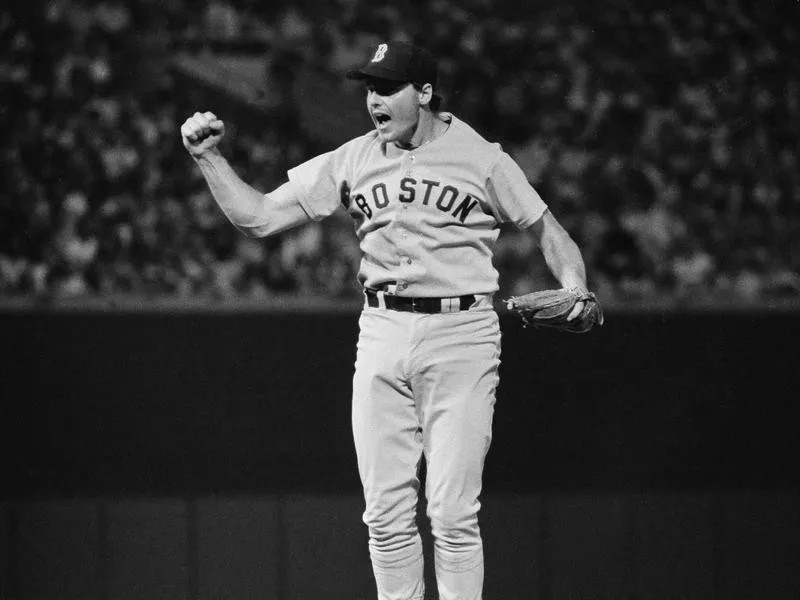
Sport: Baseball (MLB)
Position: Pitcher
Career: 1984-2007 (24 seasons)
Teams: Boston Red Sox, Toronto Blue Jays, New York Yankees, Houston Astros
Stats: 709 G, 4,916.2 IP, 354-184, 3.12 ERA, 4,672 SO
Championships: 2 (1999, 2000)
Words to remember: “It was the pitchers that kept the ‘B12’ joke going. For example, I’ve never seen Roger Clemens do steroids, and he never told me that he did. But we’ve talked about what steroids could do for you, in which combinations, and I’ve heard him use the phrase ‘B12 shot’ with respect to others. A lot of pitchers did steroids to keep up with hitters. If everyone else was getting stronger and faster, then you wanted to get stronger and faster, too. If you were a pitcher, and the hitters were all getting stronger, that made your job that much more difficult. Roger used to talk about that a lot. ‘You hitters are so darn strong from steroids,’ he’d say. ‘Yeah, but you pitchers are taking it, too. You’re just taking different types,’ I’d respond. And sometimes Roger would vent his frustration over the hits even the lesser players were starting to get off good pitchers. ‘Damn, that little guy hit it off the end of the bat and almost drove it to the wall,’ he would say. He would complain about guys who were hitting fifty homers when they had no business hitting thirty. It was becoming more difficult for pitchers all the time, he would complain. I can’t give chapter and verse on Roger’s training regimen. But I’ll tell you what I was thinking at the time: One of the classic signs of steroid use is when a player’s basic performance actually improves later in his career. One of the benefits of steroids is that they’re especially helpful in countering the effects of aging. So in Roger’s case, around the time that he was leaving Boston—and Dan Duquette, the general manager there, was saying he was ‘past his prime’—Roger decided to make some changes. He started working out harder. And whatever else he may have been doing to get stronger, he saw results. His fastball improved by a few miles per hour. He was a great pitcher long before then; it wasn’t his late-career surge that made him great. But he certainly stayed great far longer than most athletes could expect. There’s no question about that.” — Jose Canseco in “Juiced”
Bottom line: Roger Clemens might be suspected of using performance-enhancing drugs after he left the Red Sox in 1996. But nothing ever has been proven.
Is that suspicion enough to negate the first 13 years of Clemens’ career when “The Rocket” had 192 wins and 2,590 and was one of the most dominant pitchers of his generation? No way. He is an all-time great, PEDs or no PEDs, and should be in Cooperstown.
The Hall of Fame needs to figure out a better solution than blanket omissions for deserving players from the Steroids Era. That punishment does not fit the crime.
29. Chad Johnson
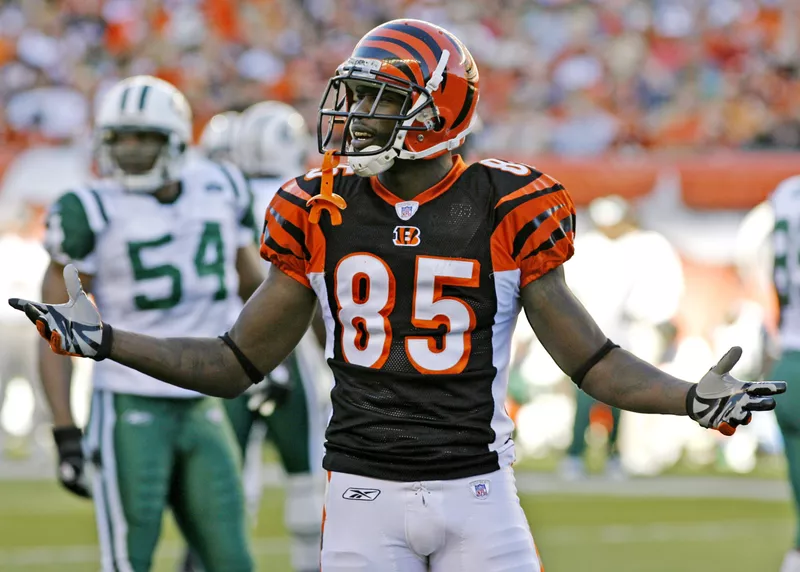
David Kohl / AP Photo
Sport: Football (NFL)
Position: Wide receiver
Career: 2001-11 (11 seasons)
Teams: Cincinnati Bengals, New England Patriots
Stats: 166 G, 766 REC, 11,059 YDS, 67 TD
Championships: None
Words to remember: “If football wasn’t a part of my life, there were three things that could have happened, and they were all bad. I would have likely been selling drugs, in jail or dead.” — Chad Johnson
Bottom line: The man formerly known as Chad Ochocinco loved football. And his biggest influence from growing up in Miami was his grandmother.
Chad Johnson also loved to entertain — from trash-talking to staged stunts on the field to iPhone games, “Dancing With the Stars,” professional bull riding and soccer off the field.
The entertainment part is what got him into trouble with the NFL and fans. As the fines from the No Fun League added up, so did misguided hate toward him.
He’s turned that hate into love since walking away from the game. “You really my favorite OG athlete … you be showing love to everybody” an internet user said on Twitter. “Not like these other old heads who wanna be bitter and talk down.”
Johnson’s reply? “young blood i will NEVER talk about anyone in a negative light.”
28. Bill Lee
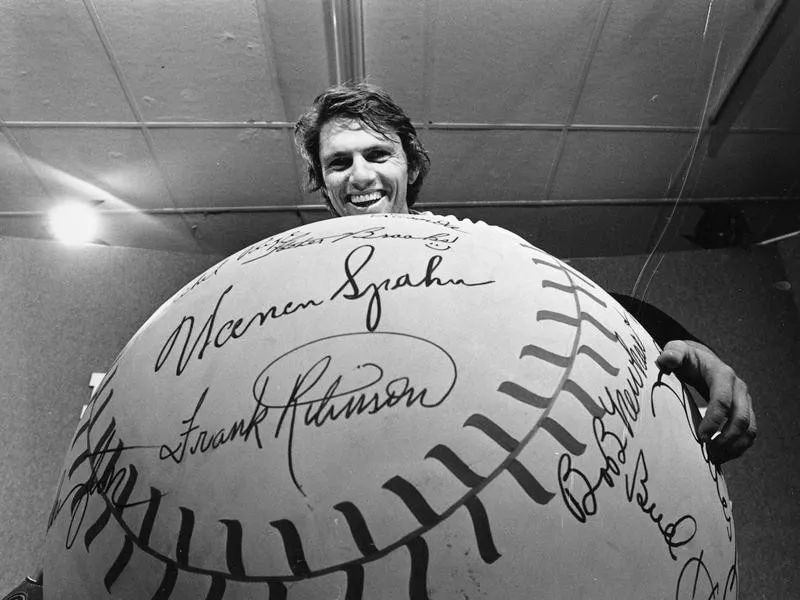
AP Photo
Sport: Baseball (MLB)
Position: Pitcher
Career: 1969-82 (14 seasons)
Teams: Boston Red Sox, Montreal Expos
Stats: 416 G, 1,944.1 IP, 119-90, 3.62 ERA, 713 SO
Championships: None
Words to remember: “Deep down inside — where nobody has ever gotten to him — Bill is a great human being. It’s just that in baseball the Peter principle reaches its highest level, and the absolute worst people run the show. Bill realized very early the ludicrousness of being in a position where so many intellectual vegetables have so much authority and influence over the way he lives his life. I always thought Bill was an accident looking for a place to happen. But he’s too intelligent to be self-destructive. He knows marginal players have to play by the rules. Any deviation from the norm is a ticket out. But he’s a master at walking the tightrope. Bill never let anybody or anything diminish his character. And he never will.” — Former Boston Red Sox pitcher Tom House in a 1978 Sports Illustrated story on Bill Lee
Bottom line: Bill Lee came from a family of baseball players in California, but he was not your typical ballplayer. “The Spaceman” was baseball’s stoner evangelist, a free spirit who was a walking, talking contradiction. The left-hander pitcher could appeal to Boston blue collars and scholars in one moment and upset them the next.
He was a true original, or “flake,” in baseball vernacular, and stood out like an Eephus pitch (which Lee threw). But he could pitch and was a great competitor, winning 17 games in three straight seasons while pitching at Fenway Park.
Even though he confused people along the way — maybe even himself at times — Lee figured out how to have a 14-year major league career. It ended sooner than he would have liked. Some say he got blackballed. But Lee never quit playing baseball (and he’s still playing to win in his 70s) while offering insights about today’s game like only he can.
Long live “The Spaceman.”
27. Stephon Marbury
Sport: Basketball (NBA and Chinese Basketball Association)
Career: 1996-2009 in NBA (13 seasons), 2011-18 in CBA (7 seasons)
Teams: Minnesota Timberwolves, New Jersey Nets, Phoenix Suns, New York Knicks, Boston Celtics, Beijing Ducks, Beijing Fly Dragons
Stats: 846 G, 19.3 PTS, 3.0 REB, 7.6 AST in NBA; 220 G, 20.2 PTS, 4.2 REB, 5.5 AST in CBA
Championships: 3 in CBA (2012, 2014, 2015)
Words to remember: “I feel good. I feel like everything was put to rest. I told my sister and she said, ‘God can open doors anywhere, Stephon.'” — Stephon Marbury, in 2016, on burying the hatchet with the NBA and becoming a basketball star in China
Bottom line: Most professional athletes start out at the mercy of whichever team chooses to pay them. When the Minnesota Timberwolves acquired Stephon Marbury (the No. 4 pick in the 1996 NBA draft) from the Milwaukee Bucks in a draft-day deal, the 19-year-old point guard joined a 20-year-old power forward named Kevin Garnett. The Twin Cities weren’t big enough for the two young stars.
Would Marbury’s NBA career have gone differently if the Bucks hadn’t traded him for Ray Allen (the No. 5 pick) and a future first-round pick? Marbury was a New York City legend as a teenager — “Starbury.” He was supposed to be the next big thing in the NBA. Instead, he became an outcast.
So he took his talents to China, won three Chinese Basketball Association (CBA) titles with the Beijing Ducks, and became a hero. Now, he’s a coach in China, and his basketball shoes are selling well, at half the price of other basketball shoes to make them accessible to more people.
Marbury’s success is a reminder of the old Zen story “Good Luck? Bad Luck? Who Knows!” Don’t worry about events beyond your control. Just accept them and move forward.
26. John Daly
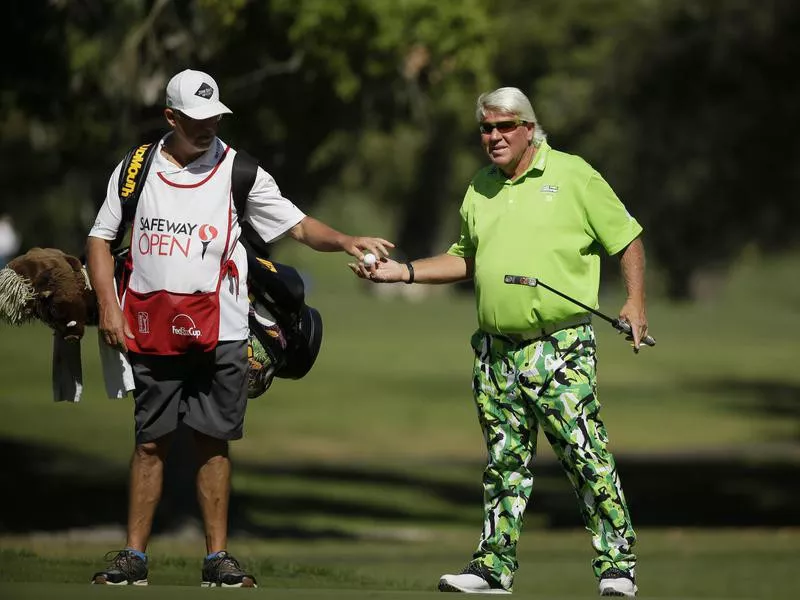
Eric Risberg / AP Photo
Sport: Golf (PGA Tour, PGA Tour Champions)
Career: 1987-present
Stats: 21 wins, 2 majors
Words to remember: “I’ve been honest with a lot of the problems I’ve had in life. Everybody has problems. They can relate to that.” — John Daly
Bottom line: John Daly is golf’s big-swinging, big-swigging everyman, straight out of central casting. In his “Wild Thing” prime, Daly could have passed for Blutarsky from “Animal House.”
The act worked, and he went from “zero to hero,” turning staid golf courses into real-life “Happy Gilmore” circuses. Fans have supported him through PGA Tour suspensions, alcohol rehab trips, failed marriages and many embarrassing moments.
Daly has shown some signs of understanding a self-destructive lifestyle is not sustainable. He has opened up his troubled childhood and abusive father, and come to terms with his gambling addiction and losing $55 million.
“It sucks, getting old,” said the 53-year-old Daly in 2019. Does that mean the father of three is ready to grow up? It’s a 50-50 shot.
25. John McEnroe
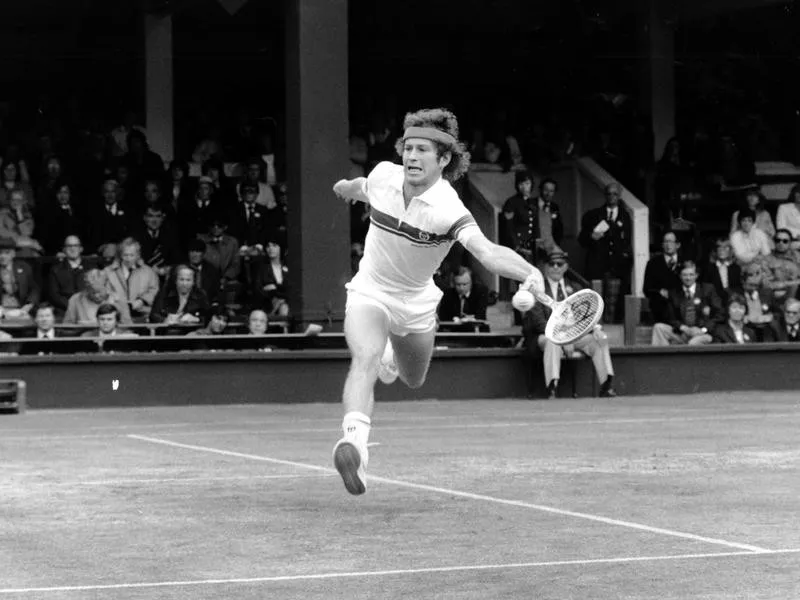
Peter Kemp / AP Photo
Sport: Tennis (ATP, ATP Champions)
Career: 1978-94
Stats: 881-198, 77 singles titles, 7 majors
Words to remember: “Everybody loves success, but they hate successful people.” — John McEnroe
Bottom line: John McEnroe was serious on the court. Too serious at times. The rebel with a racket often let his emotions get the best of him. Losing control was his Achilles heel, and it cost him some big matches.
But Johnny Mac was a great athlete and a genius with the racket. Some might say a tortured genius. Still, McEnroe found ways to hit amazing shots, and he was more than just the bad boy of tennis.
“People don’t realize what a great team player John McEnroe was,” said former Stanford University tennis coach Dick Gould, who coached McEnroe in college. “He never, as an example, turned down the ask to represent his country as a Davis Cup player. He never turned that down when he was asked, no matter how tired he was. He really believed in the team aspect of everything.”
McEnroe has learned to control his emotions and remain active in the game. He is a great tennis broadcaster and plays senior tournaments, without losing it.
24. Terrell Owens
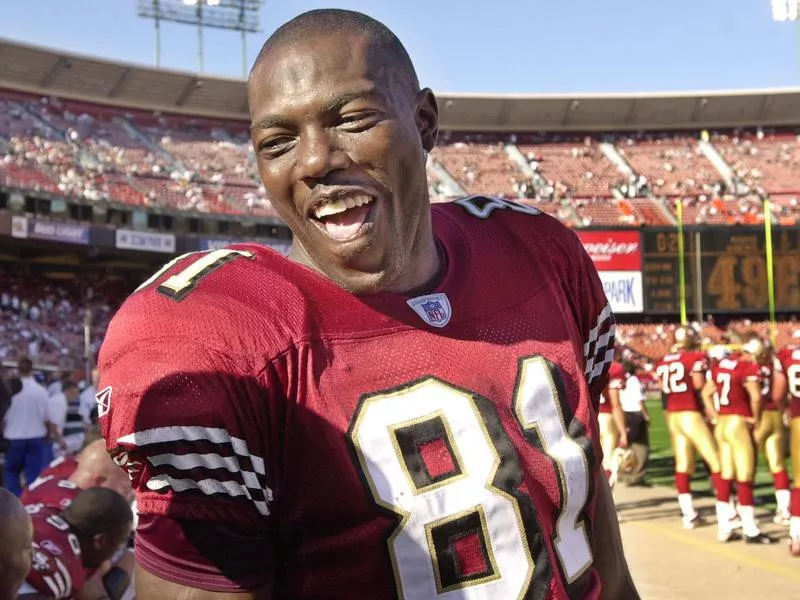
Paul Sakuma / AP Photo
Sport: Football (NFL)
Position: Wide receiver
Career: 1996-2010 (15 seasons)
Teams: San Francisco 49ers, Philadelphia Eagles, Dallas Cowboys, Buffalo Bills, Cincinnati Bengals
Stats: 219 G, 1,078 REC, 15,934 REC, 153 TD
Championships: None
Words to remember: “You look at some of the stuff guys are doing now, domestic violence, players killing players, just everything. You have so many guys with off-the-field problems, drug issues, alcohol problems and they’re still given second chances and third chances. They’re putting them in rehab and keeping them on the team. I never had those issues. It’s disappointing.” — Terrell Owens, in 2014, when he was contemplating an NFL comeback at age 40
Bottom line: Terrell Owens got a bad rap. He started his career as Jerry Rice’s replacement with the 49ers and ended it with the third-most touchdowns in NFL history. He wasn’t perfect. He made some mistakes with too much showboating and could have toned down the touchdown celebrations.
But in the end, all he wanted was to win. And in that pursuit, he got caught up in sideshows and drama. Some of it was self-inflicted, but was he a bad guy?
“The way I carried myself, having fun, being passionate about the game, a lot of people misunderstood that as bravado, being flamboyant,” Owens said. “Trust me, I had fun with it, but they never knew the core of my makeup, my character. They based their opinions on someone else’s comments. Why judge a person when you don’t know the person?”
Owens was immortalized in the Pro Football Hall of Fame in 2018, but he felt disrespected that his call to Canton came in his third year of eligibility. Now he’s working on changing people’s negative perception of him through speaking engagements around the country.
“Everyone knows about T.O., but I want to pull that curtain back and let them get to know Terrell,” Owens told the Los Angeles Times in 2019. “I was raised by my grandmother and she let me know how … the world is and how … people are, and I took that to heart. I didn’t trust a lot of people. You’re a product of your environment, and that hurt me in my professional and personal life.”
23. Aaron Hernandez
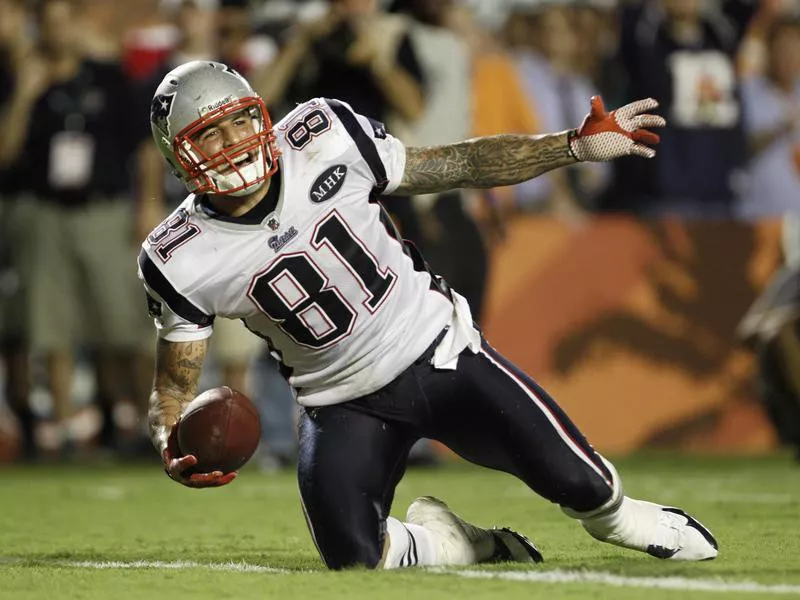
J. Pat Carter / AP Photo
Sport: Football (NFL)
Position: Tight end
Career: 2010-12 (3 seasons)
Teams: New England Patriots
Stats: 38 G, 175 REC, 1,956 YDS, 18 TD
Championships: None
Words to remember: “He changed my life. Now I’m able to basically have a good chance to be set for life, and have a good life. I have a daughter on the way, I have a family that I love. It’s just knowing that they’re going to be OK. Because I was happy playing for my $250,000, $400,000 (salary). Knowing that my kids and my family will be able to have a good life, go to college, it’s just an honor that he did that for me. He gave me this opportunity. The $50,000 to help his foundation, obviously, is basically like saying, ‘Thank you,’ and it means a lot to me. I just feel a lot of respect and I owe it back to him. Not only is it $50,000, cause that’s not really, that’s just the money that really doesn’t mean much, with the amount given, it’s more, I have a lot more to give back, and all I can do is play my heart out for them, make the right decisions, and live life as a Patriot. I called [my family] and told them obviously what the contract was, and the basics about it. They were all crying. I was crying right with them. This is probably one of the best days of my life. I’ll remember this day forever. I just hope I keep going, doing the right things, making the right decisions so I can have a good life, and be there to live a good life with my family.” — Aaron Hernandez, in August 2012, on giving $50,000 to the Myra Kraft Giving Back Fund, after signing a five-year, $40 million contract extension with the New England Patriots
“One of the touching moments since I’ve known the team — knowing that this is our charitable gala tonight — Aaron came into my office, a little teary-eyed and presented me with a check for $50,000 to go to Myra Kraft Giving Back Fund. I said, ‘Aaron, you don’t have to do this, you’ve already got your contract.’ And he said, ‘No, it makes me feel good, and I want to do it.’ That made me feel good because part of the thing that we learned early on is that we have a lot of young men who come into this business, and they come from humble financial homes, and part of what we try to do is make them understand that there is a psychic income involved in giving back both your time and your financial resources, if you can do that. And I sensed that he was touched in doing that. We didn’t request it. It’s something that he decided. And to flip the switch from living modestly to all of the sudden having a lot of income, I think we have to work real hard to help our young men adjust to that. … I just think he’s a super player, and really a first-class guy.” — New England Patriots owner Robert Kraft on Aaron Hernandez’s charitable donation
Bottom line: We’ll never know how good Aaron Hernandez could have been — on or off the football field. Hernandez started the 2010 season as the youngest player on any active roster in the NFL at 21. He was convicted in 2015 of killing semi-professional football player Odin Lloyd. Two years later, the 27-year-old Hernandez killed himself in his prison cell days after being acquitted of most charges in a separate double-murder case.
Something brought out the worst in Hernandez. A 2020 Netflix documentary called “Killer Inside: The Mind of Aaron Hernandez” posed a theory that revolved around Hernandez’s drug use, sexuality and CTE. Former Patriots teammate Devin McCourty “wasn’t a fan” of the premise, which left more questions than answers.
We’ll never really know why Hernandez threw his whole life away. All we know is that it’s a tragic case of wasted talent.
22. Gary Payton
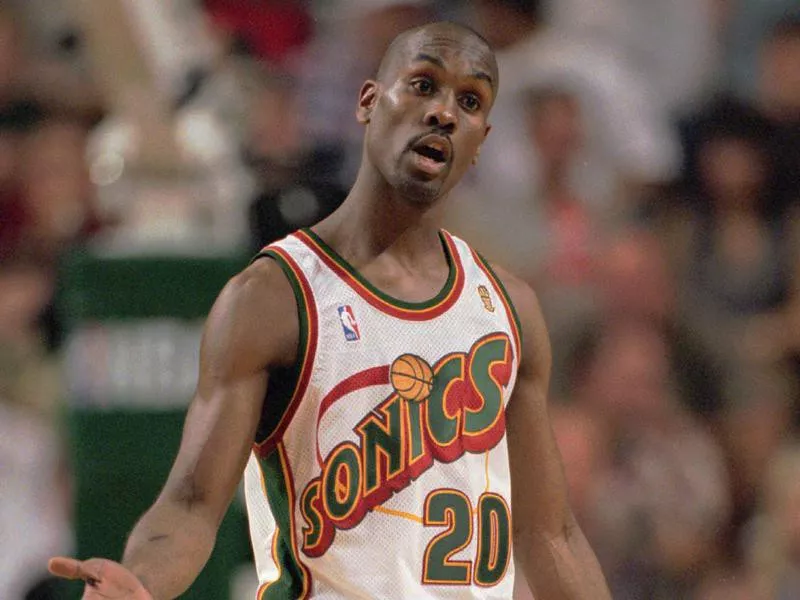
Elaine Thompson / AP Photo
Sport: Basketball (NBA)
Position: Point guard
Career: 1990-2017 (17 seasons)
Teams: Seattle SuperSonics, Milwaukee Bucks, Los Angeles Lakers, Boston Celtics, Miami Heat
Stats: 1,335 G, 16.3 PTS, 3.9 REB, 6.7 AST, 1.8 STL
Championships: 1 (2006)
Words to remember: “People say it a lot now: ‘I was expecting you to be an [expletive], but you’re not.’ I tell them, ‘I was never like that in the first place. I’m just a guy that’s outspoken. But I’m a great guy to be around. It’s just that I’m going to tell you the truth.'” — Gary Payton in 2013
Bottom line: Gary Payton’s father taught him everything he knows about basketball and toughness. Al Payton was so mean he was known as “Mr. Mean” in Oakland. “I am mean,” the elder Payton told Sports Illustrated in 1990, when his son was opening eyes at Oregon State. “I taught the kid the look, the intimidation, yeah, the meanness. When I played, I liked to hurt people.”
Gary Payton’s mother, Annie, predicted her son would be a drug dealer. So he wouldn’t become one. She knew how to challenge her competitive child, and he proved her wrong. GP kept opening eyes and ears after he got to the NBA, playing with an edge that scared some people, even teammates, and coaches.
“We always want to talk about the guys who persevered quietly,” Payton’s former Sonics coach George Karl told The Seattle Times. “Gary didn’t persevere quietly. He persevered angrily. … He demanded winning. He demanded it in himself first. Then, he demanded it of his teammates. His strength was his ability to demand winning. It was off the charts. Gary’s passion was to kick your ass. Sometimes, people got offended with how Gary got in your face and portrayed his anger, but his intentions were never misplaced.”
Those intentions got “The Glove” to the Basketball Hall of Fame. And since retirement, he’s been showing people he’s nothing like the arrogant superstar he appeared to be.
21. Lance Armstrong
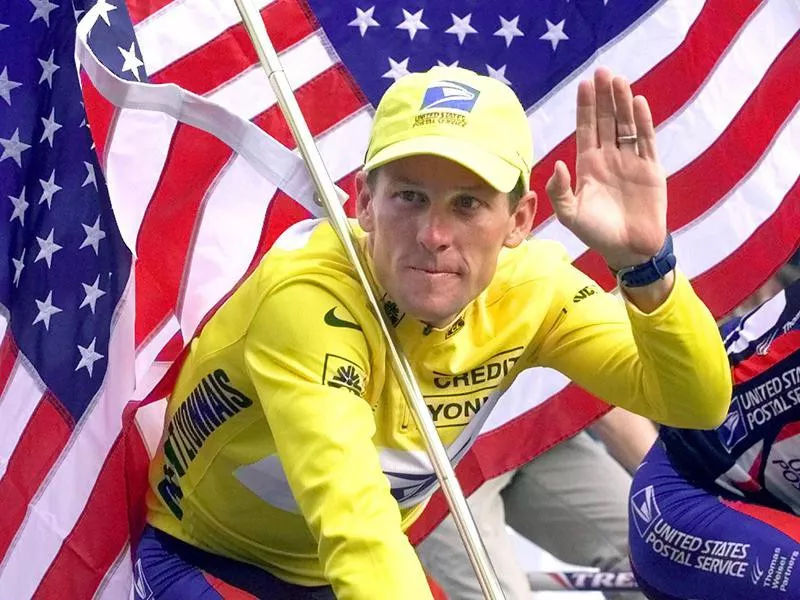
Laurent Rebours / AP Photo
Sport: Cycling
Career: 1992-2005, 2009-11
Teams: Motorola, Cofidis, U.S. Postal Service, Astana, Team RadioShack
Championships: 7 Tour de France titles (stripped)
Words to remember: “The riskiest thing you can do is get greedy.” — Lance Armstrong
Bottom line: It’s easy to reduce a person’s life to a headline or soundbite. Before you know it, somebody becomes a caricature of the complete person. But that’s not fair or accurate in the case of Lance Armstrong.
The man who was loved for surviving testicular cancer and winning seven Tour de France titles became hated for being involved in the biggest doping scandal in cycling history. His story is more complicated than that and includes his father leaving him at a young age, beatings by a stepfather, and the creation of the Lance Armstrong Foundation (now Livestrong Foundation) to help other cancer survivors.
Hero or villain? Neither at this point. He’s hurt people and helped others. Like any human, he’s imperfect. The only difference is he’s in the spotlight. But he is working on redemption, although that’s a challenge also.
“I lost it all in 48 hours. Yup,” Armstrong said in “Lance,” a new ESPN documentary about his story. “Wouldn’t change a thing. I work for myself now.”
20. Floyd Mayweather
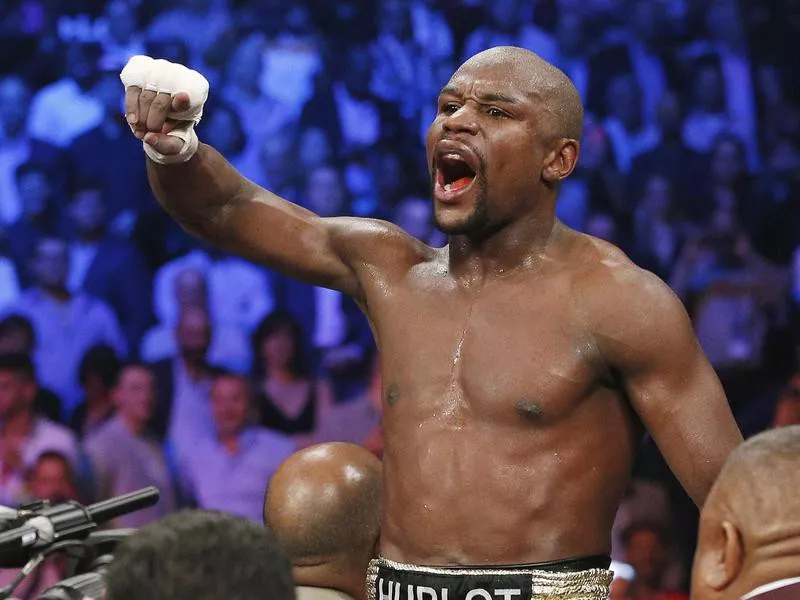
John Locher / AP Photo
Sport: Boxing
Career: 1996-2017
Stats: 50-0, 27 KO
Championships: 15 titles
Words to remember: “I think my grandmother saw my potential first. When I was young, I told her, ‘I think I should get a job.’ She said, ‘No, just keep boxing.'” — Floyd Mayweather
Bottom line: People love to build up others to tear them down. Floyd Mayweather has proven unassailable. He’s undefeated in the ring and has made over $1 billion in his career, turning TMT — The Money Team, and/or Mayweather Promotions — into a succcessful worldwide operation.
“Money” came from humble beginnings and enjoys his money, but he doesn’t get enough credit for being the people’s champ and taking care of a lot people, including his family and people outside his family. In 2007, Mayweather started his own charitable foundation, The Floyd Mayweather Foundation, to give back to the community and empower the less fortunate.
“I’m just blessed, and I just want to share my blessings,’ said Mayweather, who’s also given money to food banks, charter schools for at-risk children, Habitat for Humanity and Golden Gloves chapters to support amateur boxing.
“He does so many things for so many people and doesn’t want to be recognized for it,” said Leonard Ellerbe, CEO of Mayweather Promotions.
That’s the ultimate definition of a champion.
19. Randy Moss
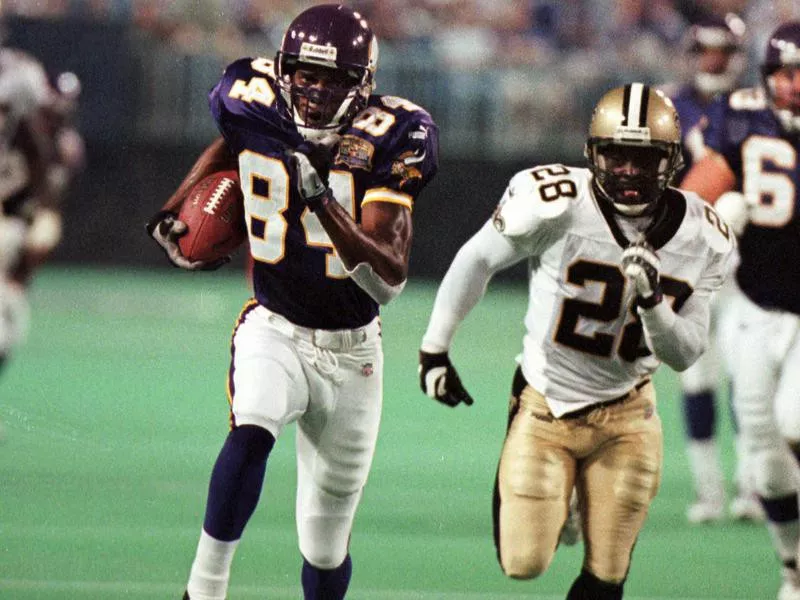
Tom Olmscheid / AP Photo
Sport: Football (NFL)
Position: Wide receiver
Career: 1998-2010, 2012 (14 seasons)
Teams: Minnesota Vikings, Oakland Raiders, New England Patriots, San Francisco 49ers
Stats: 218 G, 982 REC, 15,292 YDS, 156 TD
Championships: None
Words to remember: “My brother [Butch] played pro basketball, so I was around when guys like Magic and Bird were coming in. Do you understand that this kid could be Michael Jordan? That we’re on the ground floor of something huge?” — Former Minnesota Vikings wide receiver Cris Carter, in a 1998 Sports Illustrated story, on rookie teammate Randy Moss
Bottom line: Randy Moss was all-everything in football, basketball, baseball and track at DuPont High School in West Virginia. But the “No Moss” narrative started at the end of high school because of a racially charged fight.
The incident cost him a football scholarship to Notre Dame (his dream school), where coach Lou Holtz called him “the best high school player I’ve ever seen.” Moss transferred to Florida State, where coach Bobby Bowden called him “as good as Deion Sanders … for athletic ability … just a bigger Deion,” but lost that scholarship due to a positive marijuana test. So Moss ended up at Division 1-AA Marshall, where he scored 54 touchdowns in 28 games, won the 1997 Biletnikoff Award as the best receiver in the nation, and finished fourth in Heisman voting.
The labels still followed him to the 1998 NFL draft. Misfit. Miscreant. Thug. He dropped all the way No. 21, where the Minnesota Vikings picked him. Twenty years later, he was inducted into the Pro Football Hall of Fame in his first year of eligibility. Yet google “Randy Moss thug” today, and you still get 2.7 million results.
Even when you have 4.2 speed, the second-most touchdowns in NFL history, and indomitable work ethic, it’s hard to outrun a haunted past and “character issues,” especially when so many people want you to fail. Moss learned from his mistakes. Now, he is a role model, showing the power of faith, family and football.
18. LaVar Ball
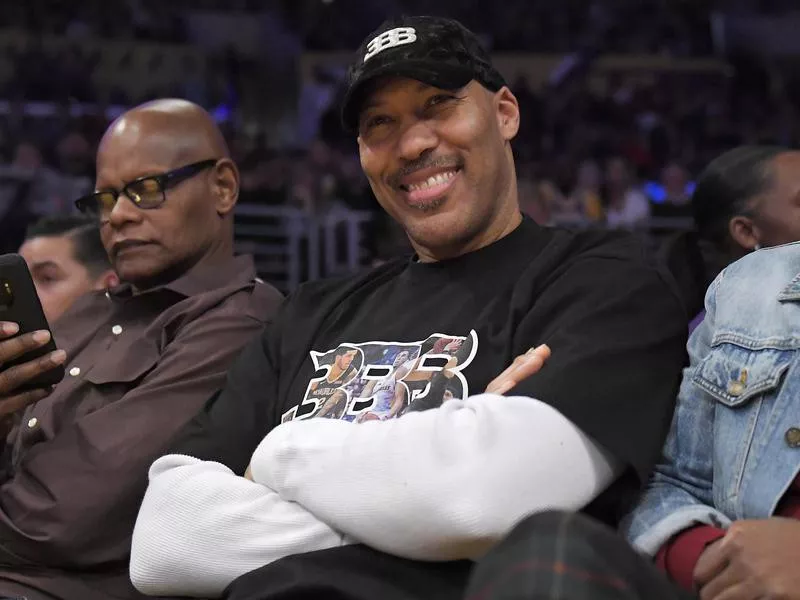
Mark J. Terrill / AP Photo
Sport: Basketball and football (college and World League of American Football)
Career: 1987-88, 1994-95
Teams: Washington State Cougars, London Monarchs
Stats: 26 college basketball games, 2.2. PTS, 2.3 REB
Championships: None
Words to remember: “A billion dollars. It has to be there. That’s our number, a billion, straight out of the gate. And you don’t even have to give it to me all up front. Give us $100 mil over 10 years.” — LaVar Ball, in 2017, on packaging his three sons (Lonzo, LiAngelo and LaMelo) for a marketing deal with Nike, Adidas or Under Armour. He later upped the asking price to $3 billion but didn’t get any takers.
Bottom line: LaVar Ball did not become a household name because of his skills on a football field or basketball court. But one day, he might deserve a “Family Man of the Year” award.
You might not agree with his methods, but everything he does is for one reason — to set up his three sons and wife for life. That’s why he makes all those loud, wild remarks. It’s why he started Big Baller Brand and isn’t giving up on the company after failing in its first iteration. Behind the showman is a down-to-earth dad and husband.
“Listen. I used to always think … that the key to life is having a passion to do something and then if you happen to get paid for it, I used to say you won in life,” Ball said during an episode of “Ball in the Family” for his wife’s 51st birthday in 2018. “The only thing I say different now (is) if you lucky enough, hopefully, you guys (are), is to find somebody that you can get old with. And I think that’s the key to life. I went to Tina’s birthday when she was 21 years old. First birthday. It’s been 30 years that have went by. We got these beautiful sons, all you guys, friends, family. I got lucky. I wouldn’t trade this for the world. And I think that’s the key to life.”
You might disagree with the biggest Ball’s methods, but they are far from madness.
17. Shoeless Joe Jackson
Sport: Baseball (MLB)
Career: 1908-20 (13 seasons)
Teams: Philadelphia Athletics, Cleveland Naps/Indians, Chicago White Sox
Stats: 1,332 G, 1,772 H, .356 BA, 54 HR, 792 RBI, .940 OPS
Championships: 1 (1917)
Words to remember: “God knows I gave my best in baseball at all times, and no man on earth can truthfully judge me otherwise.” — Shoeless Joe Jackson
Bottom line: Both Babe Ruth and Ty Cobb considered Shoeless Joe Jackson the greatest hitter they ever saw. Ruth even modeled his hitting style after him.
Yet to this day, Jackson is not celebrated the way he should be. He’s remembered as one of the eight men who were banned from baseball for the 1919 Black Sox scandal, when the Chicago White Sox lost to the Cincinnati Reds (five games to three) and were accused of intentionally losing for a gambling syndicate led by gangster Arnold Rothstein.
Jackson confessed to receiving money from gamblers, but he led all players with 12 hits in the series, batting .375 with three doubles, one home run and six RBI in 32 at-bats over eight games.
Does that sound like someone who threw the series?
16. Bjorn Borg
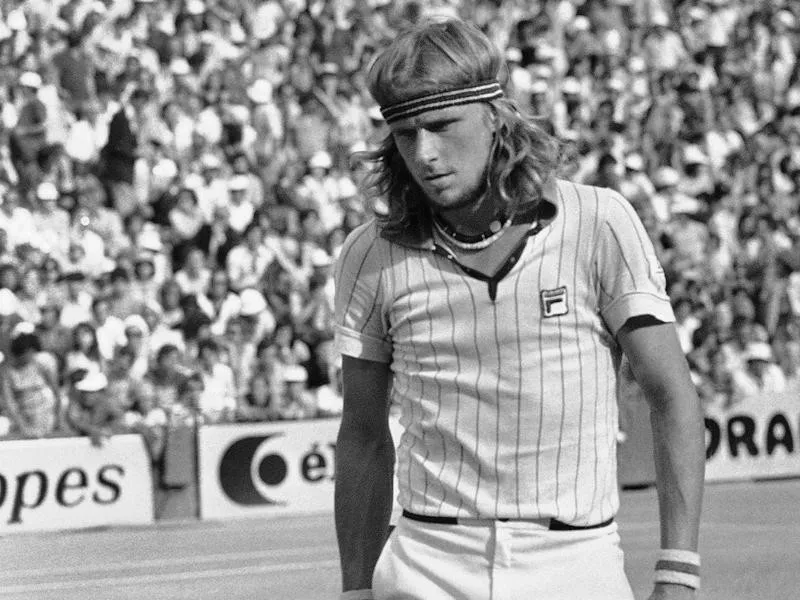
Michel Lipchitz / AP Photo
Sport: Tennis (ATP Tour)
Career: 1973-83, 1991-93
Stats: 644-135, 64 singles titles, 11 majors
Words to remember: “You have to find it. No one else can find it for you.” — Bjorn Borg
Bottom line: Other tennis players won more titles. They showed more emotion. But no one had more skill than Bjorn Borg, who won 11 Grand Slams (six Wimbledons and five French Open) in a seven-year span from 1974 to 1981.
Borg shocked the tennis world by walking away from the game at the age of 26. Not too many people understood this decision or the cool Swede, who was nicknamed “Ice Borg” for his icewater demeanor. But the silent assassin internalized his fire, developing his emotionless playing style after his parents threatened to end their 14-year-old son’s tennis career for racket abuse and yelling on the court.
In other words, Borg’s toughest opponent was himself. “I think Bjorn could have won the U.S. Open. I think he could have won the Grand Slam, but by the time he left, the historical challenge didn’t mean anything,” Arthur Ashe once told Sports Illustrated. “He was bigger than the game. He was like Elvis or Liz Taylor or somebody.”
It took failing in retirement — in relationships and business ventures — for Borg to find his way and true happiness.
15. Michael Vick
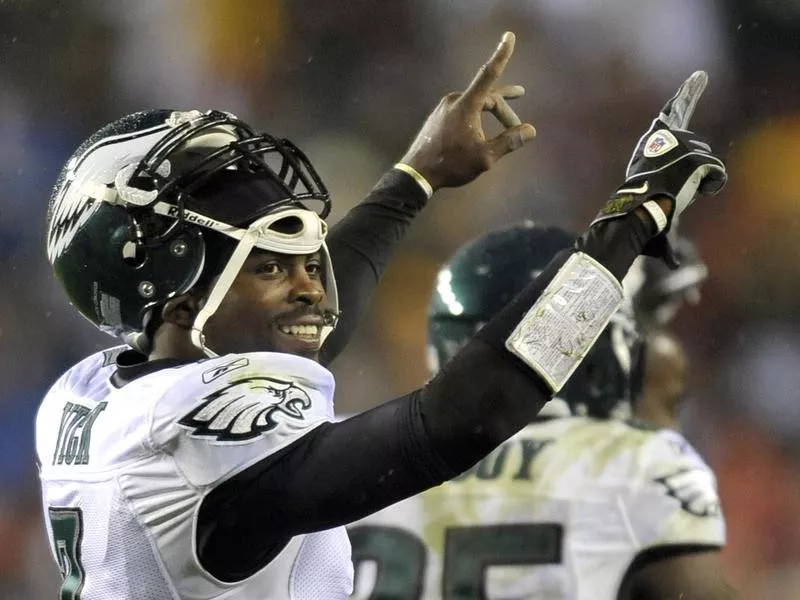
Gail Burton / AP Photo
Sport: Football (NFL)
Position: Quarterback
Career: 2001-06, 2009-15 (13 seasons)
Teams: Atlanta Falcons, Philadelphia Eagles, New York Jets, Pittsburgh Steelers
Stats: 143 G, 22,464 YD, 133 TD, 88 INT, 56.2 CMP%
Championships: None
Words to remember: “Yeah, you got the family dog and the white picket fence, and you just think that’s all there is. Some of us had to grow up in poverty-stricken urban neighborhoods, and we just had to adapt to our environment. I know that it’s wrong. But people act like it’s some crazy thing they never heard of. They don’t know.” — Michael Vick in a 2011 GQ story entitled “The Impossible, Inevitable Redemption of Michael Vick“
Bottom line: Everyone loves a good comeback story, but not all comebacks are treated equal. While Michael Vick wasn’t the first athlete to make a mistake off the field, he was the first NFL quarterback to run a dogfighting ring. And he paid the price for it, doing 548 days behind bars at Leavenworth, a federal prison in Kansas, as Inmate No. 33765-183.
The experience changed him for the better. He rebuilt his career and became a strong advocate for dogs. However, the controversy also was an emotional flashpoint for America, and some people still have a hard time forgiving Vick.
Race has something to do with it, which a 2020 ESPN “30 fo 30” documentary called “Vick,” examines. So does animal cruelty, as some animal rights supporters believe he has not been punished enough.
Vick changed the way the quarterback position is played in football. Now, he has an even bigger opportunity — to show that a person is much more than the worst thing they ever did.
14. Bill Buckner
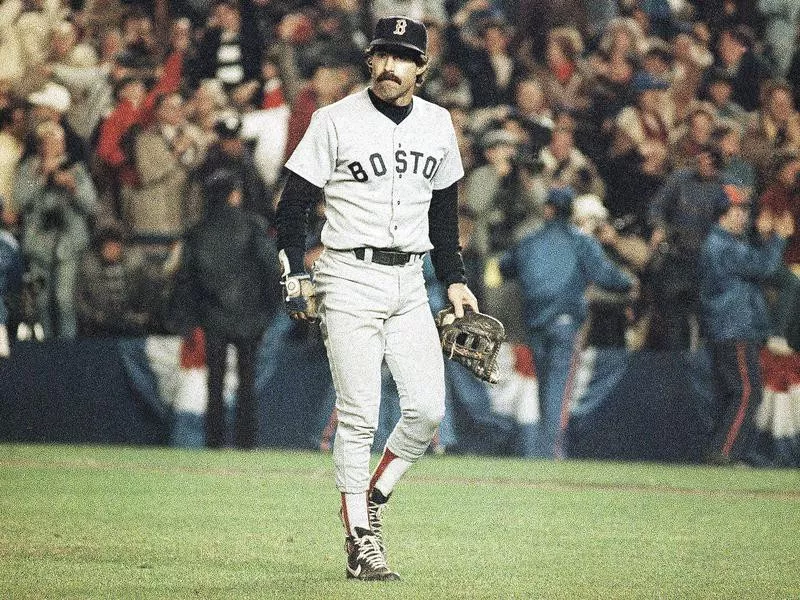
Rusty Kennedy / AP Photo
Sport: Baseball (MLB)
Position: First baseman and left fielder
Career: 1969-90 (22 seasons)
Teams: Los Angeles Dodgers, Chicago Cubs, Boston Red Sox, California Angels, Kansas City Royals
Stats: 2,517 G, 2,715 H, .289 BA, 174 HR, 1,208 RBI, .729 OPS
Championships: None
Words to remember: “In my heart, I had to forgive the media, for what they put me and my family through.” — Bill Buckner after throwing out the ceremonial first pitch for the Red Sox on Opening Day at Fenway Park in 2008
Bottom line: It wasn’t Bill Buckner’s fault, but he was the easy scapegoat for the Red Sox’s World Series loss to the Mets in 1986. That’s the way life works. The most convenient narrative often becomes the dominant one, so “Bill F—— Buckner Lost the World Series and Got Exiled From New England” was the story.
That story (which was more myth than reality) overshadowed a solid major league career that produced 2,715 hits and one batting title over four decades. Buckner was a good player, not an all-time goat, and it is unfair he faced so much public scorn at the end of his career and in retirement. Some Red Sox media and fans fanned the flames and never let up.
Once the Red Sox won the World Series in 2004 — breaking the infamous “Curse of the Bambino” after 86 years — Buckner finally got a reprieve and some of the recognition he deserved. He died in 2019 at the age of 69 and still is remembered with an error.
13. Nick Diaz
Sport: Mixed martial arts (UFC, PRIDE, Strikeforce, EliteXC, World Extreme Cagefighting (WEC), DREAM, and Shooto)
Career: 2001-15 (14 years)
Stats: 37 fights, 26 wins (13 KOs, 8 submissions), 9 losses, 2 draws
Championships: Welterweight (Strikeforce, WEC)
Words to remember: “I’m the only one who’s invested in a fight life. That’s why none of these other guys can ever say s—. They’re too worried about what their families and their wives and the people around them will think, so they’re too scared to speak up. That’s why I invested everything in my fight life. That’s why I come off the way I do and always have. Every other fighter has a life on the side. I’ve never had another job. I didn’t graduate eighth grade. I could have, but I got into too many fights in middle school.” — Nate Diaz
Bottom line: Fighting never has never been an issue for Nick Diaz. The never-say-die brawler from Stockton, California, got into professional combat sports so he wouldn’t have to break the law, but then the sport robbed him of a shot to prove he was the best UFC fighter in the world by suspending five years for smoking a joint.
Playing “the game” (as Dana White put it) was the toughest part of the fight life for Diaz, who knows real heartbreak. His girlfriend committed suicide before his first professional MMA fight. “I would run seven miles and back to her grave just to promise her I would make it as a fighter like she knew and had told me she knew and was proud of me,” he said.
Nick Diaz hasn’t fought in the cage since 2015, but he remains as tough as they come and will always have the heart of a warrior. If you need a reminder, watch this.
12. Barry Bonds
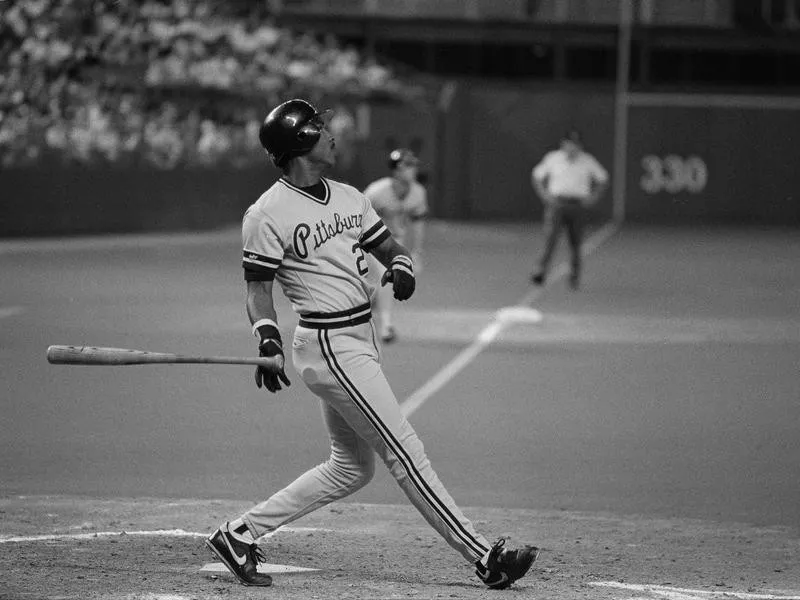
Tim Johnson / AP Photo
Sport: Baseball (MLB)
Position: Left fielder
Career: 1986-2007 (22 seasons)
Teams: Pittsburgh Pirates, San Francisco Giants
Career stats: 1,539 G, 1,726 H, .295 BA, 381 HR, 1,239 RBI, .933 OPS
Championships: None
Words to remember: “Hell, I kick myself now, because I’m getting great press [since being more cooperative], and I could have had a trillion more endorsements, but that wasn’t my driving force. The problem was, when I tried to give in a little bit, it never got better. I knew I was in the midst of that image, and I determined at that point that I was never going to get out of it. So I just said, ‘I’ve created this fire around me, and I’m stuck in it, so I might as well live with the flames.'” — Barry Bonds, in a 2016 interview with Terence More for Sports on Earth, on regretting being a jerk his whole career. Bonds admitted he created the persona when he was a young player with the Pirates.
Bottom line: Love or hate him, Barry Bonds was one of the greatest hitters in baseball. Ever. Just look at his swing. Compact, quick, powerful. The swing had everything, and steroids had nothing to do with it.
The son of big leaguer Bobby Bonds, Barry grew up around the game and developed his five-tool skills the old-fashioned way. That’s why it’s a shame his name is linked with steroids. Although he was convicted of obstruction of justice in the government’s case against the Bay Area Laboratory Co-Operative (BALCO) in 2011, he denied wrongdoing and never admitted to knowingly doing performance-enhancing drugs. Does that mean he never did steroids?
“You’re talking about something that wasn’t even illegal at the time,” Bonds said about steroids in March 2005. “All this stuff about supplements, protein shakes, whatever. Man, it’s not like this is the Olympics. We don’t train four years for, like, a 10-second [event]. We go 162 games. You’ve got to come back day after day after day. … There are far worse things like cocaine, heroin and those types of things.”
Steroids were banned in MLB since 1991, but the league did not implement league-wide PED testing until 2003. Bonds reportedly tested positive for steroids. That wasn’t right (in terms of ethical hazards and rule-breaking), but some smart minds have documented that steroids do not help hitters hit home runs.
If that’s not enough, shouldn’t MLB bear responsibility for not doing a better job of policing the game? The league let Bonds play, so how can anyone say his home run record is tainted or deserves an asterisk?
Even in retirement, the seven-time MVP still can rake. In 2019, before a Giants-Yankees game at AT&T Park, he put on a hitting clinic. At the age of 54. “No one’s comparable to Bonds,” wrote San Francisco Chronicle columnist John Shea, who witnessed the hitting performance.
Meanwhile, rumors of Bonds being a bad teammate and terrible human have been greatly exaggerated. He’s even done some good off the field that doesn’t get much pub at all.
So when is baseball’s home run king getting into Cooperstown?
11. Mike Tyson
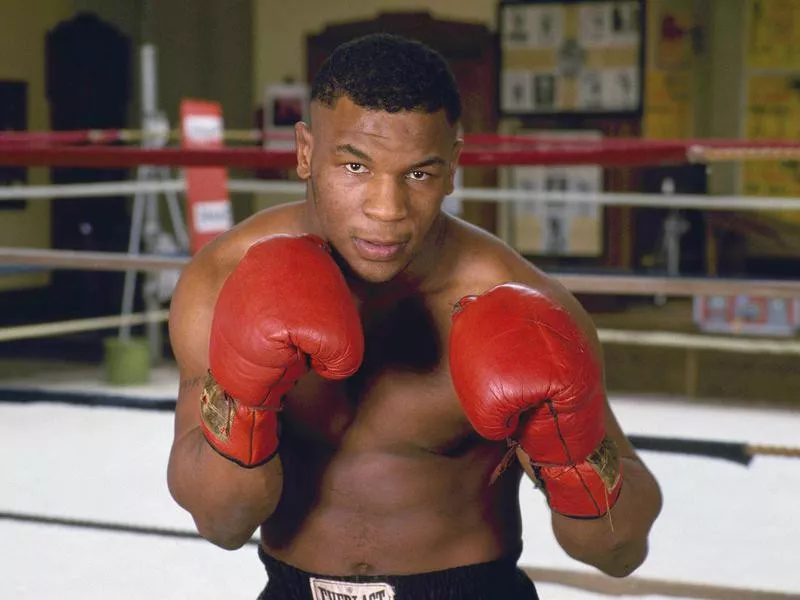
AP Photo
Sport: Boxing
Career: 1985-2005
Stats: 50-6-2, 44 KO
Championships: WBC, WBA and IBF world heavyweight titles
Words to remember: “I’m not an athlete, don’t call me an athlete. How can you compare me with Billie Jean King or Magic Johnson? They’re athletes. Athletes have careers. Athletes have to prepare. At any moment, I’m ready. I never liked sports. Sports are only social events. I’m a warrior, a missionary. What I do is an obsession. If I wasn’t in boxing, I’d be breaking laws, that’s my nature.” — Mike Tyson, in a 1988 Sports Illustrated story called “Tyson the Timid, Tyson the Terrible,” on his mentality as a boxer
Bottom line: Before Mike Tyson became the scariest fighter on earth, he robbed people and beat them up for fun as a kid in Brownsville, New York. He saw people get shot, stabbed and beaten with baseball bats. That environment made Tyson want to brutalize others, yet he still maintained an air of innocence. “I did evil things,” he once said. “But my heart was always pure.”
That’s why he would hand out $100 bills to poor people on the streets after he became rich as the heavyweight champion of the world. The world, for a long time, only saw the savage Tyson. He was the embodiment of “Don’t Let Me Be Misunderstood,” the 1964 classic song by The Animals.
I’m just a soul whose intentions are good
Oh Lord, please don’t let me be misunderstood
It took many years of personal struggles and professional losses for Tyson to seek redemption and show his true character. Now, the whole world only knows his humanity.
10. Allen Iverson
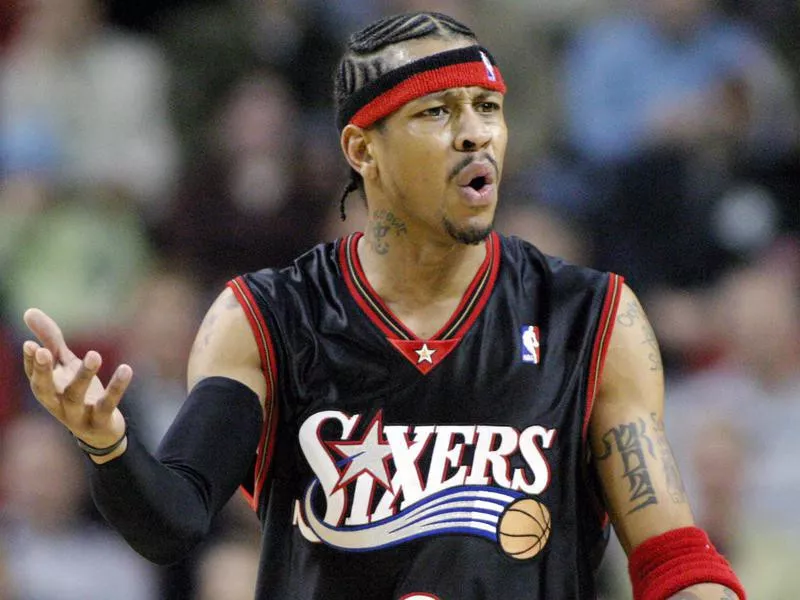
John Froschauer / AP Photo
Sport: Basketball (NBA)
Position: Point guard and shooting guard
Career: 1996-2010 (14 seasons)
Teams: Philadelphia 76ers, Denver Nuggets, Detroit Pistons, Memphis Grizzlies
Stats: 914 G, 26.7 PTS, 6.2 AST, 3.7 REB
Words to remember: “I always looked at it, and I always felt like … why isn’t it cool being you? What’s wrong with being you, with your flaws, with your mistakes, with the way you look, with your financial status, the way you talk? What’s wrong with that? God gave you all of those things. That’s how He wanted it to be. So why are you ashamed of it?” — Allen Iverson, in The Undefeated, on why he’s always been comfortable being himself
Bottom line: He shocked the NBA with his style. Sold out arenas with his skills. And opened eyes with his life.
No one had ever seen an athlete with Allen Iverson’s swagger and gangster attitude. He was just being himself, a once-in-a-lifetime baller who survived a tough background in Hampton Roads, Virginia, to become a Basketball Hall of Famer.
“The ones that stuck by me throughout my journey, I love y’all,” he said during his Hall of Fame speech in 2016. “I love the fact that now y’all can walk around and stick y’all chest out and say y’all Hall of Famers.”
Iverson never won an NBA ring, but he played with the heart of a champion. And this basketball immortal will always be loved for it.
9. Tiger Woods
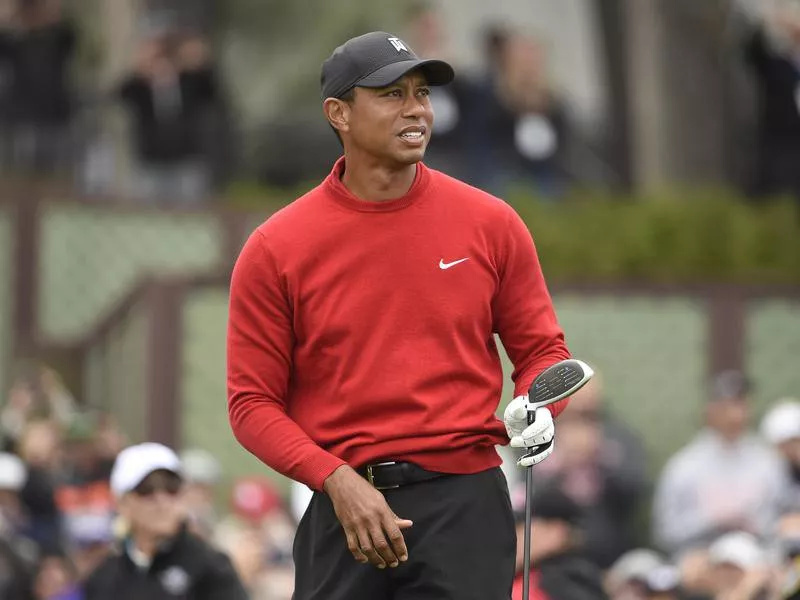
Denis Poroy / AP Photo
Sport: Golf (PGA Tour)
Career: 1996-present
Stats: 110 wins, 15 majors
Words to remember: “Money and fame made me believe I was entitled. I was wrong and foolish. I don’t get to live by different rules. The same boundaries that apply to everyone apply to me.” — Tiger Woods, in a 2010 statement, after admitting infidelities in his marriage
Bottom line: Tiger Woods was born to be a golf champion, and he didn’t disappoint.
He won at a historic pace. He took home record amounts of money. He built a brand that was stronger than IBM, Coke and McDonald’s combined. He carefully crafted an image that was representative of what he wanted the world to see, know and perceive about him.
He was it. But it wasn’t real. And Woods almost lost everything. After taking time off to deal with personal scandals and injuries that took him to rock bottom, Woods won the 2019 Masters to complete the greatest comeback in sports history.
And he isn’t finished creating a legacy that’s greater than golf.
8. Tom Brady
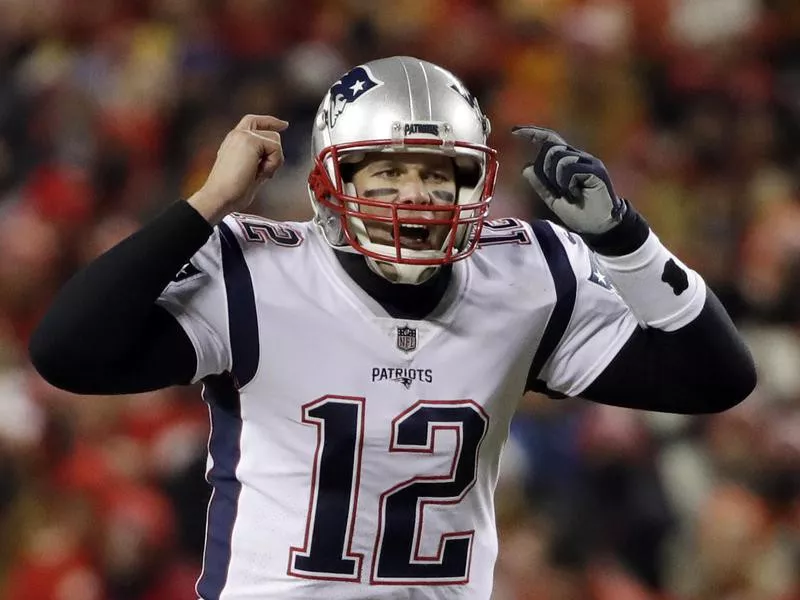
Elise Amendola / AP Photo
Sport: Football (NFL)
Position: Quarterback
Career: 2000-22 (23 seasons)
Teams: New England Patriots, Tampa Bay Buccaneers
Stats: 335 G, 89,214 YDS, 64.3 CMP%, 649 TD, 212 INT
Championships: 7 (2001, 2003, 2004, 2014, 2016, 2018, 2020)
Words to remember: “Tom Brady is one of the most misunderstood athletes or celebrities that we have in this country. If you can’t look at what Brady’s done and appreciate and embrace who he is, then you’re missing what’s great about America.” — One of Tom Brady’s former New England Patriots teammates, who won a Super Bowl with him early in his career
Bottom line: Tom Brady has everything except one thing — universal respect. Some people will never give him the credit he deserves. And that’s a shame because Brady is greatness personified.
“Here is what you need to understand: There is not a guy in the National Football League who loves football more than Tom Brady,” said Patriots receiver Matthew Slater, who has played 12 seasons with Brady. “And it’s not just that he loves going out on Sundays. He loves preparation, he loves taking care of his body, he loves meetings, he loves film, coaching other guys. He loves every bit of it. And that’s what drives him to be great.”
You don’t make the plays Brady has made in the clutch, under pressure, for 23 years, unless you are great. Don’t worry. He’s not losing any sleep over those who question his ability.
He played the game with the same chip on his shoulder he had since his rookie year and collected seven rings.
7. Kobe Bryant
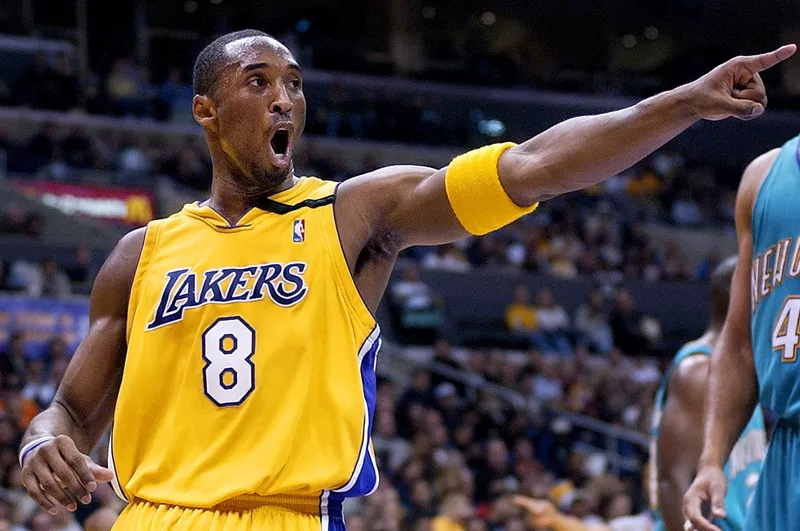
Mark J. Terrill / AP Photo
Sport: Basketball (NBA)
Position: Shooting guard
Career: 1996-2016 (20 seasons)
Teams: Los Angeles Lakers
Stats: 1,346 G, 25.0 PTS, 5.2 REB, 4.7 AST
Championships: 5 (2000, 2001, 2002, 2009, 2010)
Words to remember: “I’m not here to be a great teammate. I’m here to help you win championships.” — Kobe Bryant, speaking to USC students in 2018, on his competitive philosophy during his playing career
Bottom line: Kobe Bryant loved basketball from the day he started playing at the age of 2. When he was 6, he moved to Italy with his family and grew up there in the 1980s. His grandfather used to send him tapes of NBA games, and the young Kobe would study them and dream of being the best basketball player to ever play the game.
That hunger drove Kobe to be one of the game’s all-time greats and fiercest competitors. It also drove him to be misunderstood, even hated. Kobe wasn’t perfect, but he learned from his mistakes and overcame his struggles to become one of the most inspirational athletes of any generation.
After a 20-year NBA career, he was excelling in life after basketball — winning an Oscar for an animated film, writing children’s books, championing women’s sports, coaching youth basketball, and being a dutiful husband and father to four daughters. On Jan. 26, 2020, Kobe died in a helicopter crash at the age of 41. His 13-year-old daughter Gianna and seven other people were on the helicopter and also died. Gianna had her own hoop dreams and planned to carry the Mamba torch. They all left this world too soon. Now their spirits will grow in power together.
This is the power of Kobe. Even in death, he continues to be an inspiring force. We don’t need to debate whether Kobe was the greatest. We can just appreciate his greatness.
6. Ted Williams
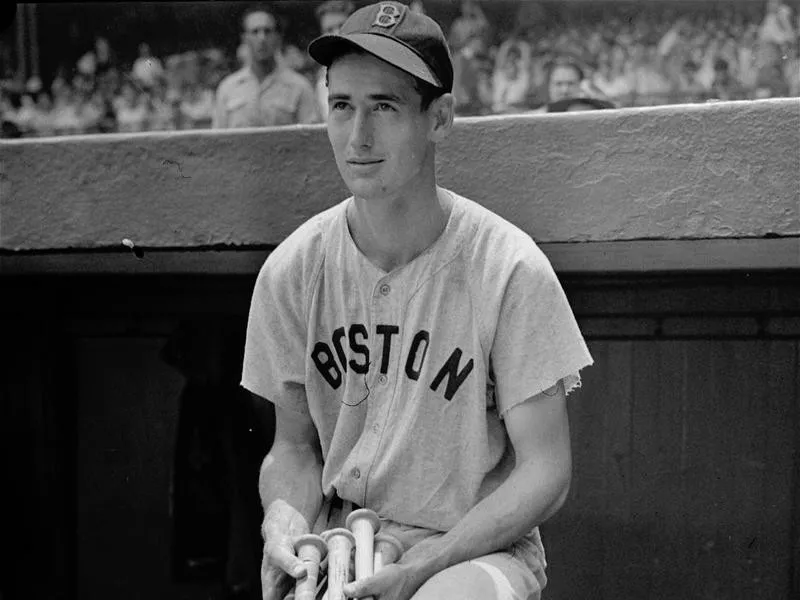
AP Photo
Sport: Baseball
Position: Left fielder
Career: 1939-42, 1946-60 (19 seasons)
Teams: Boston Red Sox
Stats: 2,292 G, .344 BA, 521 HR, 1,839 RBI, 1.116 OPS
Championships: None
Words to remember: “I know how lucky I’ve been in life, more than anybody will ever know. I’ve lived a kind of precarious lifestyle, precarious in sports, flying and baseball. I worked hard (at flying). I wasn’t prepared to go into it. Then I had to work as hard as hell to try to keep going, to try and keep up. I think that’s as great an accomplishment as I did in my life. The other thing, of course, is that I had a good baseball career.” — Ted Williams in an interview at the Baseball Hall of Fame in 2000
Bottom line: Ted Williams was a real American hero. After serving his country for three years during World War II as a naval aviator, he gave another 17 months of service in the Marines during the Korean War, flying 39 combat missions and even surviving an emergency landing in which he refused to eject to save his baseball career.
“It was the only real fear I had flying a plane, that if I had to bail out I wouldn’t make it,” said Williams, who once was John Glenn’s wingman. “I thought I’d surely leave my kneecaps in there. I’d have rather died than never to have been able to play baseball again.”
Williams missed the equivalent of five MLB seasons in his prime to go to war. He could have had an easy wartime assignment and played on a service baseball team during this time, like most major leaguers did, but he chose combat. He was one of only 10 percent of Navy fliers to earn their wings and graduated at the top of his class.
Most people don’t remember this sacrifice from Williams, but he approached flying with the same “head down, go to work” attitude that was his trademark. He had discipline and duty and honor and courage. So why did this hero become an anti-hero to some Red Sox fans in Boston? Williams was uncompromising, or as John Updike explained, “refused to tip his cap to the crowd or turn the other cheek to newsmen.”
All Williams wanted out of life was to be the greatest hitter who ever lived. Williams wasn’t perfect — he could be temperamental and tactless — but he was the last player to hit .400 for an entire season, owns the highest on-base percentage (.482) in MLB history and literally wrote the book on hitting, “The Science of Hitting.” As the son of a Mexican mother, he also was exposed to prejudice growing up in San Diego, California, and attuned to any form of disrespect.
Combine a proud man who did not appreciate any form of booing with a tough city like Boston that has no problem booing, and that’s how a baseball god only wins two MVP awards and gets characterized as a cantankerous jerk. All was forgiven at Ted Williams Day at Fenway Park in 1991, when “The Kid,” at 72, tipped his cap, and one of baseball’s good guys — a true legend — got his due.
5. Metta World Peace (formerly Ron Artest)
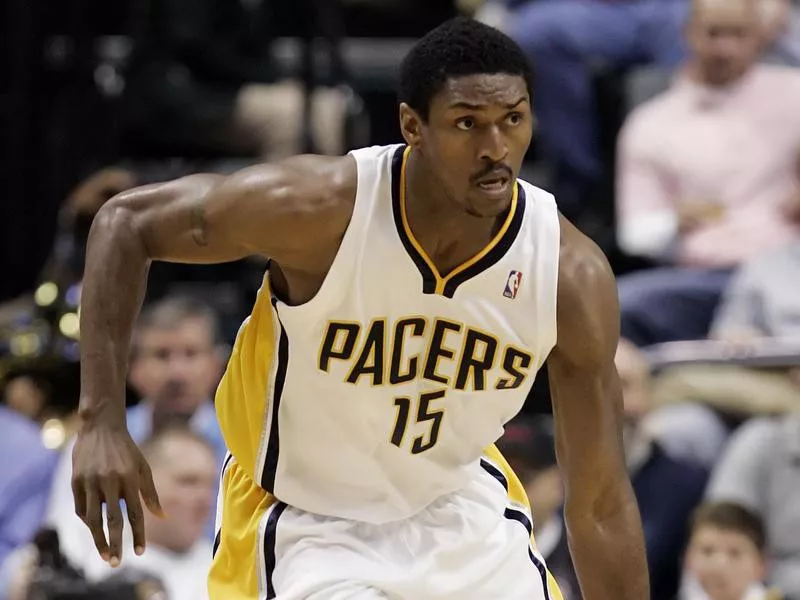
Darron Cummings / AP Photo
Sport: Basketball (NBA)
Position: Small forward
Career: 1999-2014, 2015-17 (17 seasons)
Teams: Chicago Bulls, Indiana Pacers, Sacramento Kings, Houston Rockets, Los Angeles Lakers, New York Knicks
Stats: 991 G, 13.2 PTS, 4.5 REB, 2.7 AST
Championships: 1 (2010)
Words to remember: “Ron is the most important sports story of the last 20 years. You can talk about LeBron, Kobe and Kaepernick, but Ron created a ripple effect that actually has led to societal discussion and potential change.” — Johnny Sweet, the director of “Quiet Storm,” a 2019 documentary about Ron Artest’s life and survival over mental health issues
Bottom line: To understand how far Ron Artest (now known as Metta World Peace) has come, we need to go back to where he started — Queensbridge, New York.
The largest public housing project in the United States was a tough place to grow up. Basketball was Artest’s ticket out, but he played the game with a hard edge that scared people at times. Despite his supreme talent, he struggled with mental illness. That struggle almost cost him his career.
Artest figured out he needed help and was brave enough to accept it. Once he did, everything fell into place. He won a world championship with the Lakers (sealing the title with a clutch 3-pointer on a pass from Kobe Bryant) and then gave a shout-out to his shrink. He became an advocate for mental health issues, went back to school, started his own company, created a foundation to help underprivileged kids and even legally changed name to a Buddhist word (Metta) that means loving kindness toward all. Now he is helping develop players as a coach with the Lakers.
“Who comes back from what we dismiss as crazy and rescues himself?” says journalist Mark Kriegel.
From warrior to healer, and villain to hero, it’s an amazing story.
4. Marshawn Lynch
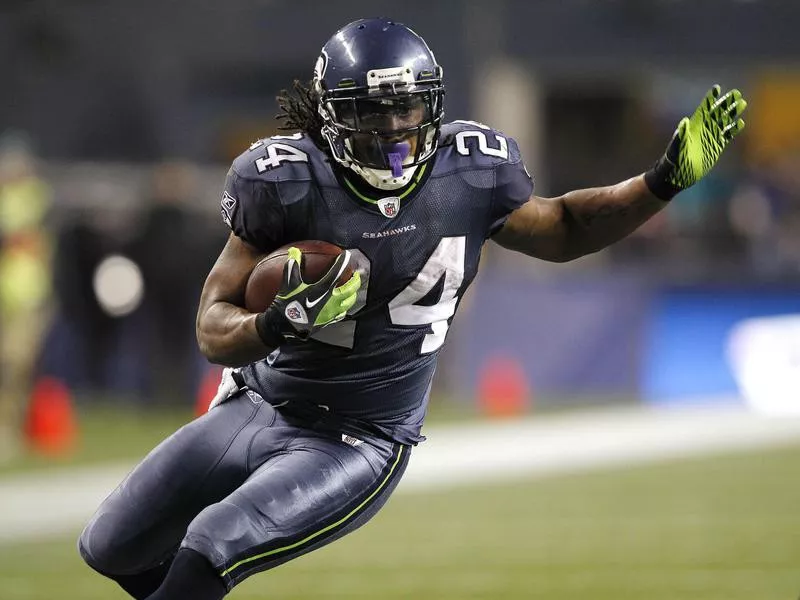
Elaine Thompson / AP Photo
Sport: Football (NFL)
Position: Running back
Career: 2007-15, 2017-19 (12 seasons)
Teams: Buffalo Bills, Seattle Seahawks, Oakland Raiders
Championships: 1 (2013)
Words to remember: “It get to a point where in order to fit in, you gotta learn how to code switch — where you gotta not be yourself in order to fit in and to stick around. You don’t get too many athletes that actually go into it with the mindset that they’ll continue to be themselves and give back to the younger athletes in order to start a change and start something differently. Most people will say it’s about getting your money. … Getting money means just go out there and play football and shut up. So if you think outside the box, you tend to shorten your career or not get your career started.” — Marshawn Lynch, during a MLK Now 2020 panel, on the lack of black people in ownership and executive suites in the NFL
Bottom line: The real Marshawn Lynch is much more than his “Beast Mode” brand. Yes, Lynch is a beast on the football field — an all-time great NFL running back— but he’s also a fun-loving dude, successful entrepreneur and thoughtful human being.
“It’s a vulnerable time for a lot of these young dudes, feel me?” said Lynch after his final game of the 2019 season with the Seahawks. “They don’t be taking care of their chicken right. … I’ll tell y’all right now while y’all in it, take care of your bread so when you’re all done, you can go ahead and take care of yourself. Start taking care of y’all mentals, y’all bodies and y’all chicken. So when you’re ready to walk away, you walk away, and you be able to do what you want to do.”
Lynch has been famously silent with the media throughout his career, but the Oakland native has a lot to say when he chooses to say it. Lynch majored in social welfare at Cal and has been working with underprivileged youth for a long time.
“Marshawn’s impact on the field is easy to see,” said Oakland Raiders owner Mark Davis in 2018. “But it is off the field where he really makes a difference. While others may talk the talk, Marshawn walks the walk.”
Lynch always has stayed true to himself and taken care of his chicken and mentals to create a business empire built on integrity. The world could learn a few things from him.
3. Antonio Brown
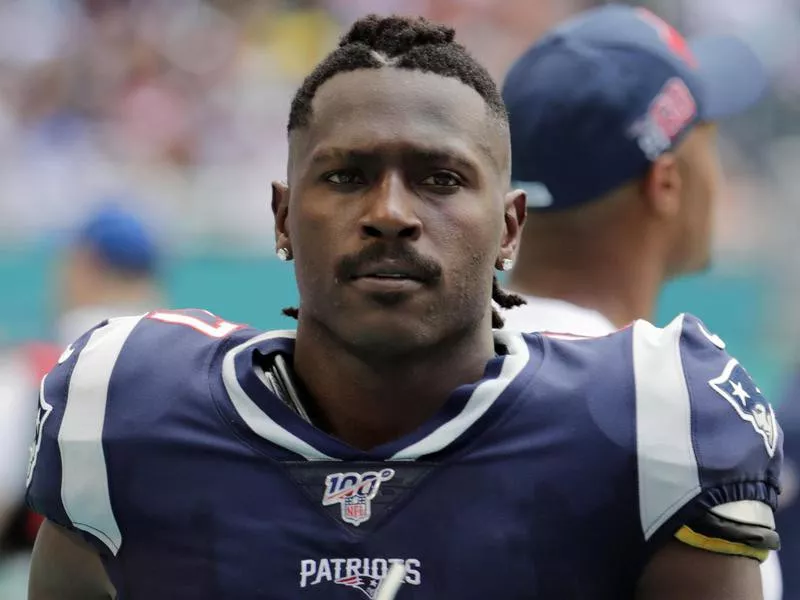
Lynne Sladky / AP Photo
Sport: Football (NFL)
Position: Wide receiver
Career: 2010-21 (12 seasons)
Teams: Pittsburgh Steelers, Oakland Raiders, New England Patriots, Tampa Bay Buccaneers
Stats: 146 G, 928 REC, 12,291 YDS, 83 TD
Championships: None
Words to remember: “I think I owe the whole NFL an apology and my past behavior. I think I could have done a lot of things better.” — Antonio Brown, in an ESPN interview on Jan. 31, 2020, expressing remorse for missteps that have kept him out of the NFL since September 2019
Bottom line: The first step to recovery is admitting you have a problem. Antonio Brown has shown some signs of doing that in the past. He’s also been his own worst enemy.
All the drama was self-defeating for Brown’s NFL employment opportunities, but it has not affected the public’s interest in him. He was the most searched athlete (and person) on Google in 2019. His popularity took hit since then due to some erratic behavior.
Brown had Hall of Fame football skills in his prime and could have some mileage left in his tank. At this point in his life, he would benefit from Marshawn Lynch’s advice and work on his mentals, his chicken and his craft to make a comeback.
The NFL was better with Brown in it playing at his highest level. Some people continue to root for him. He needs to help himself first before others can help him, though. If he can get on a healthy path and stay focused on what he does best (play football), he still might be capable of being a positive role model and inspiring greatness.
2. Jack Tatum
Sport: Football (NFL)
Career: 1971-80 (10 seasons)
Teams: Oakland Raiders, Houston Oilers
Stats: 136 G, 37 INT, 10 FR (fumble recoveries)
Championships: 1 (1976)
Words to remember: “I don’t care who gets in my way — my mother, my grandmother, my daughter: I’ll knock each and every one of them on their ass.” — Jack Tatum
Bottom line: You don’t get a nickname like “The Assassin” by accident. Jack Tatum had clear intentions on the football field, and none of them were good.
Tatum was one of the hardest hitters and most intimidating players in NFL history. Starting at Passaic High School in New Jersey, continuing at Ohio State, and graduating to the Raiders in the pros, he could change a game with one collision. When one of those vicious collisions paralyzed New England Patriots wide receiver Darryl Stingley during a 1978 preseason game, Tatum changed two lives. Stingley’s and his own.
Tatum’s hit was clean, but the unfortunate incident came to define the safety’s career. Because he never apologized to Stingley for the hit, or his bone-crushing style of play, Tatum became vilified, the “symbol of a violent game,” as The New York Times wrote in Tatum’s 2010 obituary. According to longtime sports journalist Ron Borges, the late Stingley forgave Tatum, but “much of the football never did.”
Tatum was not a remorseless human being. He was a tough football player. One of the best who ever lived. He should be in Canton, immortalized in the Hall of Fame.
1. Pete Rose
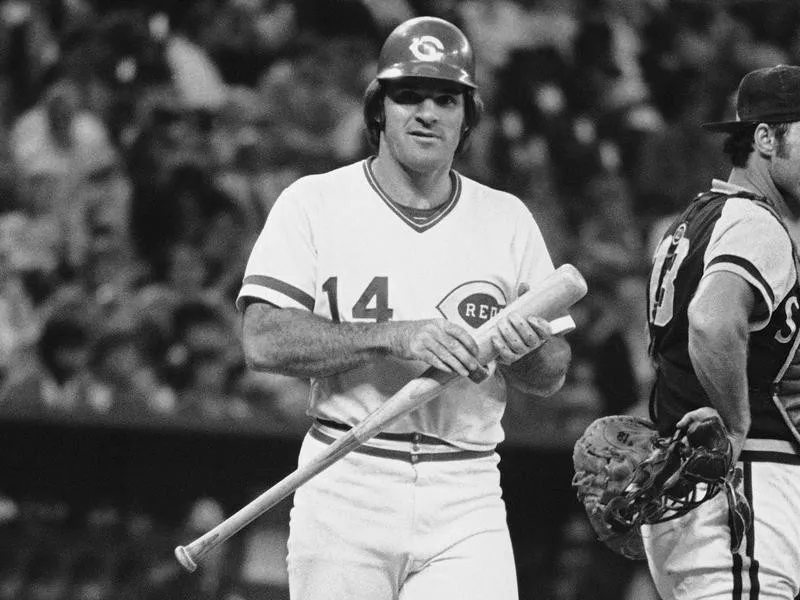
Sport: Baseball (MLB)
Position: Outfield, first base, third base
Career: 1963-86 (24 seasons)
Teams: Cincinnati Reds, Philadelphia Phillies, Montreal Expos
Stats: 3,562 G, 4,256 H, .303 BA, 160 HR, 1,314 RBI, .784 OPS
Championships: 3 (1975, 1976, 1980)
Words to remember: “I bet on my own team to win. That’s what I did in a nutshell. I was wrong, but I didn’t taint the game. I didn’t try to steal any games. I never voted against my team. I bet on my team every night because that’s the confidence that I had in my players. I was wrong.” — Pete Rose
Bottom line: Look up baseball player in the dictionary, and you’ll see a picture of Pete Rose, charging hard, somewhere on the diamond. Full speed is the only speed he knew.
During spring training of his rookie year, Rose got the nickname “Charlie Hustle” from New York Yankees pitcher Whitey Ford after sprinting to first base with a walk (and, according to Mickey Mantle, also scaling an outfield fence for a home run that was long gone). Ford meant the name in a derisive way. Rose took it as a badge of honor.
The irony of Rose’s lifetime ban from baseball (the game he loves) is that he played the game the right way 100 percent of the time. His trouble came when he bet on baseball games as a manager and lied about it. Rose was a gambling addict, but he has come clean about what he did and admitted wrongdoing.
Hall of Fame columnist Jim Murray of the Los Angeles Times summed up the matter of the game’s integrity best during an interview with Roy Firestone in the early 1990s: “Pete is the supreme victim in all of this. Baseball’s alright. He didn’t really hurt baseball. What did he do to baseball? Are there 10,000 less people going to Cincinnati? … Pete only hurt himself.”
The Hall of Fame is not the Hall of Goodness. Rose made a mistake. He’s paid a big enough price for it and should be in Cooperstown. Baseball is hurting itself as much as Rose by keeping him out and still punishing the all-time hit king.
When will baseball rectify the injustice?